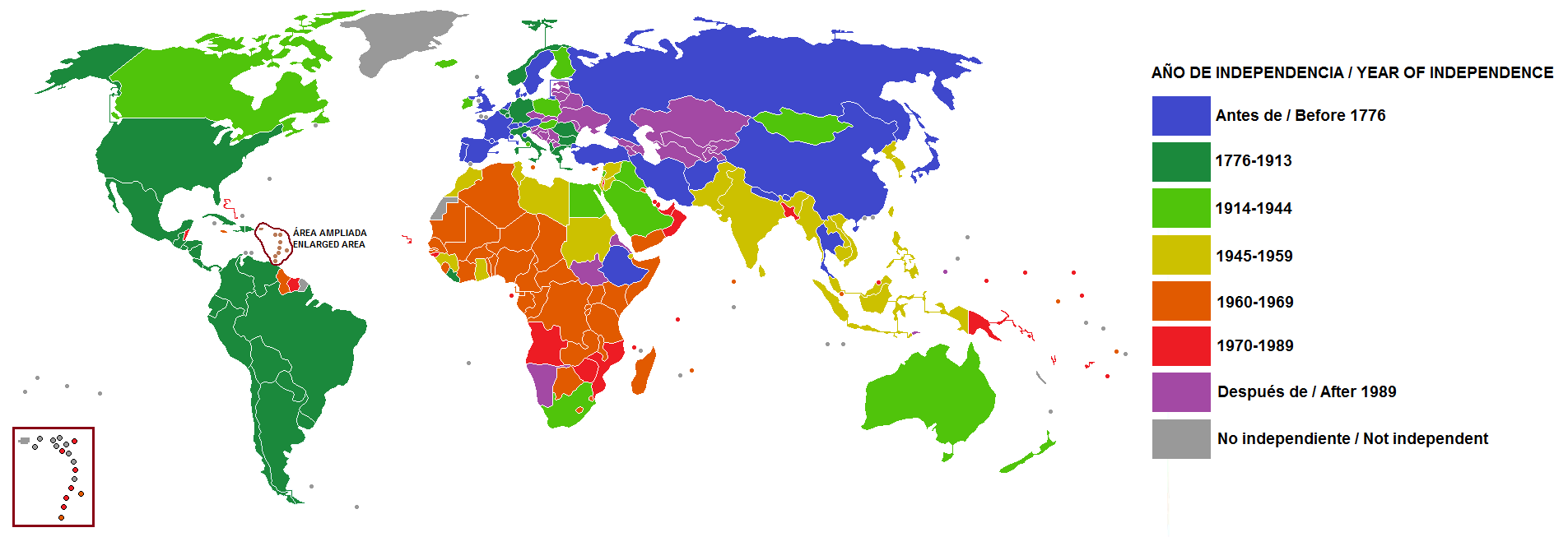
脱植民地化
Decolonization
Map of the year each country achieved
independence.
★
わたしたちのとりうる姿勢は、世界と無関係にあるどころか、権力と利害関心(=インタレスツ)と骨がらみになっている(サイード 2025:17)
☆ 脱植民地化とは(端的には政治的統治システムである)植民地主義を撤廃することである。植民地主義とは、帝国主義国家が外国の領土(多くは海外)を支配下に置くプロセスである。この用語の意 味と適用については様々な議論がある。脱植民地化研究者の一部は、特に植民地の独立運動と世界的な植民地帝国の崩壊に焦点を当てている。 植民地化された地域がそれぞれの宗主国から独立を確立する運動として、脱植民地化は1775年に北米で始まった。脱植民地化の大きな波は、第一次世界大戦 と第二次世界大戦後に起こった。 批判的な学者は、植民地化された人々の独立や平等な権利という概念[のみならず哲学、教育、倫理、文化的生活様式すらをも含む概念]を、植民地経験のより広範な経済的、文化的、心理的側面を含むものとして拡張している。 脱植民地化の概念を政治的独立の枠を超えて拡張することは議論を呼んでおり、批判も受けている(→「知識の脱植民地化」「脱植民地化の方法論」)。
★
政治的プロセスにおける脱植民地化とは、左から右にいたる時系列のなかで生起する。脱植民地化は時間的プロセスであり、空間的変化であるが、主権国家の樹
立を「独立」とよび、その前後で、植民地からポスト植民地へと「位相」が変わる。
★ このページでは、政治的・歴史的概念としての「脱植民地化」を解説する。脱植民地下状況にある個人(主体)や複数の個人、地域集団あるいは国民などの集合 的な主体の脱植民地化については、将来「精神や思想(こころ)の脱植民地化」の項目で考えていみたい(→脱植民地性:デコロニ アリティ・デコロニアリダド)。脱植民地性(Decoloniality:decolonialidad) とは、地球上の他の存在形態を可能にするために、ヨーロッパ中心主義的な知識のヒエラルキーや世界におけるあり方から脱却することを目指す学派ないしは、 考え方である。
| ★
ただし、植民地からの政治的経済的に独立し、オートノミックな統治性を回復する「脱植民地化(decolonization)」と、知識や精神の脱植民地
化は、密接に連動しており、それぞれ別個に研究できるが同時に、両者は、時に平行して研究調査しなければならない側面もあることに、人びとは、留意すべき
である。 |
| Decolonization Decolonization is the undoing of colonialism, the latter being the process whereby imperial nations establish and dominate foreign territories, often overseas.[1] The meanings and applications of the term are disputed. Some scholars of decolonization focus especially on independence movements in the colonies and the collapse of global colonial empires.[2][3] As a movement to establish independence for colonized territories from their respective metropoles, decolonization began in 1775 in North America. Major waves of decolonization occurred in the aftermath of the First World War and most prominently after the Second World War. Critical scholars extend the meaning beyond independence or equal rights for colonized peoples to include broader economic, cultural and psychological aspects of the colonial experience.[4][5] Extending the meaning of decolonization beyond political independence has been disputed and received criticism.[6][7][8] |
脱植民地化 脱植民地化とは、植民地主義を撤廃することである。植民地主義とは、帝 国主義国家が外国の領土(多くは海外)を支配下に置くプロセスである[1]。この用語の意味と適用については議論がある。脱植民地化研究者の一部は、特に 植民地の独立運動と世界的な植民地帝国の崩壊に焦点を当てている[2][3]。 植民地化された地域がそれぞれの宗主国から独立を確立する運動として、脱植民地化は1775年に北米で始まった。脱植民地化の大きな波は、第一次世界大戦 と第二次世界大戦後に起こった。 批判的な学者は、植民地化された人々の独立や平等な権利という概念を、植民地経験のより広範な経済的、文化的、心理的側面を含むものとして拡張している [4][5]。脱植民地化の概念を政治的独立の枠を超えて拡張することは議論を呼んでおり、批判も受けている[6][7][8]。 |
| Scope The United Nations (UN) states that the fundamental right to self-determination is the core requirement for decolonization, and that this right can be exercised with or without political independence.[9] A UN General Assembly Resolution in 1960 characterised colonial foreign rule as a violation of human rights.[10][11] In states that have won independence, Indigenous people living under settler colonialism continue to make demands for decolonization and self-determination.[12][13][14][15] Although discussions of hegemony and power, central to the concept of decolonization, can be found as early as the writings of Thucydides,[16] there have been several particularly active periods of decolonization in modern times. These include the decolonization of Africa, the breakup of the Spanish Empire in the 19th century; of the German, Austro-Hungarian, Ottoman, and Russian Empires following World War I; of the British, French, Dutch, Portuguese, Belgian, Italian, and Japanese Empires following World War II; and of the Soviet Union at the end of the Cold War.[17] Early studies of decolonisation appeared in the 1960s and 1970s. An important book from this period was The Wretched of the Earth (1961) by Martiniquan author Frantz Fanon, which established many aspects of decolonisation that would be considered in later works. Subsequent studies of decolonisation addressed economic disparities as a legacy of colonialism as well as the annihilation of people's cultures. Ngũgĩ wa Thiong'o explored the cultural and linguistic legacies of colonialism in the influential book Decolonising the Mind (1986).[4] "Decolonization" has also been used to refer to the intellectual decolonization from the colonizers' ideas that made the colonized feel inferior.[18][19][20] Issues of decolonization persist and are raised contemporarily. In the Americas and South Africa, such issues are increasingly discussed under the term decoloniality.[21][22] |
範囲 国連(UN)は、自己決定権は脱植民地化にとって最も重要な要件であり、この権利は政治的独立の有無に関わらず行使できるとしている[9]。1960年の 国連総会決議では、植民地支配を人権侵害とみなしている[10][11]。独立を果たした国々では、入植者による植民地主義の下で暮らす先住民が 入植者による植民地主義の下で暮らす先住民は、今もなお脱植民地化と自己決定を要求し続けている[12][13][14][15]。 脱植民地化の概念の中心となる覇権と権力についての議論は、トゥキュディデスの著作に早くも登場しているが[16]、近代には特に活発な脱植民地化の時期 がいくつかあった。これには、19世紀のスペイン帝国の解体、第一次世界大戦後のドイツ帝国、オーストリア・ハンガリー帝国、オスマン帝国、ロシア帝国の 解体、第二次世界大戦後のイギリス帝国、フランス帝国、オランダ帝国、ポルトガル帝国 、ベルギー、イタリア、日本の帝国が第二次世界大戦後に解体されたこと、そして冷戦終結時にソビエト連邦が解体されたことなどである[17]。 脱植民地化の初期の研究は、1960年代と1970年代に登場した。この時代における重要な著作に、マルティニーク出身の作家フランツ・ファノンによる 『大地の惨禍』(1961年)がある。この本は、後の著作で取り上げられることになる脱植民地化の多くの側面を確立した。その後の脱植民地化研究では、植 民地主義の遺産としての経済格差や、人々の文化の消滅が取り上げられた。Ngũgĩ wa Thiong'o は、影響力のあった著書『Decolonising the Mind』(1986年)で、植民地主義の文化的・言語的遺産について考察した[4]。 「脱植民地化」という言葉は、植民地化された人々が劣等感を抱く原因となった植民地支配者の考えからの知的脱植民地化をも指すために使用されてきた [18][19][20]。脱植民地化の問題は依然として存在し、現代でも取り上げられている。アメリカ大陸や南アフリカでは、脱植民地化という用語のも とで、このような問題がますます議論されるようになっている[21][22]。 |
| Independence movements In the two hundred years following the American Revolutionary War in 1783, 165 colonies have gained independence from Western imperial powers.[23] Several analyses point to different reasons for the spread of anti-colonial political movements. Institutional arguments suggest that increasing levels of education in the colonies led to calls for popular sovereignty; Marxist analyses view decolonisation as a result of economic shifts toward wage labor and an enlarged bourgeois class; yet another argument sees decolonisation as a diffusion process wherein earlier revolutionary movements inspired later ones.[23][24][25][26] Other explanations emphasize how the lower profitability of colonization and the costs associated with empire prompted decolonization.[27][28] Some explanations emphasize how colonial powers struggled militarily against insurgents in the colonies due to a shift from 19th century conditions of "strong political will, a permissive international environment, access to local collaborators, and flexibility to pick their battles" to 20th century conditions of "apathetic publics, hostile superpowers, vanishing collaborators, and constrained options".[29] In other words, colonial powers had more support from their own region in pursuing colonies in the 19th century than they did in the 20th century, where holding on to such colonies was often understood to be a burden.[29] A great deal of scholarship attributes the ideological origins of national independence movements to the Age of Enlightenment. Enlightenment social and political theories such as individualism and liberalism were central to the debates about national constitutions for newly independent countries.[30] Contemporary decolonial scholarship has critiqued the emancipatory potential of enlightenment thought, highlighting its erasure of Indigenous epistemologies and failure to provide subaltern and Indigenous people with liberty, equality, and dignity.[31] American Revolution Main article: American Revolution Great Britain's Thirteen North American colonies were the first to declare independence, forming the United States of America in 1776, and defeating Britain in the Revolutionary War.[32][33] Haitian Revolution Main article: Haitian Revolution The Haitian Revolution was a revolt in 1789 and subsequent slave uprising in 1791 in the French colony of Saint-Domingue, on the Caribbean island of Hispaniola. In 1804, Haiti secured independence from France as the Empire of Haiti, which later became a republic. Spanish America Main article: Spanish American wars of independence 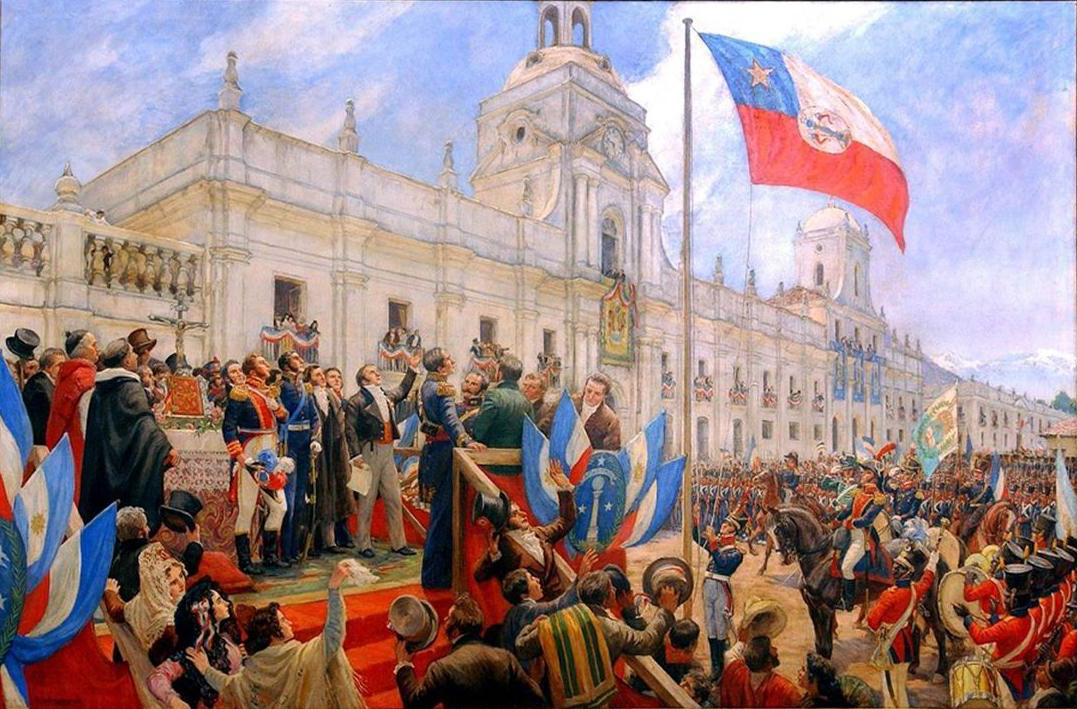 Portrait of the Chilean declaration of independence The Chilean Declaration of Independence on 18 February 1818 The chaos of the Napoleonic Wars in Europe cut the direct links between Spain and its American colonies, allowing for the process of decolonization to begin.[34] With the invasion of Spain by Napoleon in 1806, the American colonies declared autonomy and loyalty to King Ferdinand VII. The contract was broken and each of the regions of the Spanish Empire had to decide whether to show allegiance to the Junta of Cadiz (the only territory in Spain free from Napoleon) or have a junta (assembly) of its own. The economic monopoly of the metropolis was the main reason why many countries decided to become independent from Spain. In 1809, the independence wars of Latin America began with a revolt in La Paz, Bolivia. In 1807 and 1808, the Viceroyalty of the River Plate was invaded by the British. After their 2nd defeat, a Frenchman called Santiague de Liniers was proclaimed a new Viceroy by the local population and later accepted by Spain. In May 1810 in Buenos Aires, a Junta was created, but in Montevideo it was not recognized by the local government who followed the authority of the Junta of Cadiz. The rivalry between the two cities was the main reason for the distrust between them. During the next 15 years, the Spanish and Royalist on one side, and the rebels on the other fought in South America and Mexico. Numerous countries declared their independence. In 1824, the Spanish forces were defeated in the Battle of Ayacucho. The mainland was free, and in 1898, Spain lost Cuba and Puerto Rico in the Spanish–American War. Puerto Rico became an unincorporated territory of the US, but Cuba became independent in 1902. Portuguese America Main article: Independence of Brazil 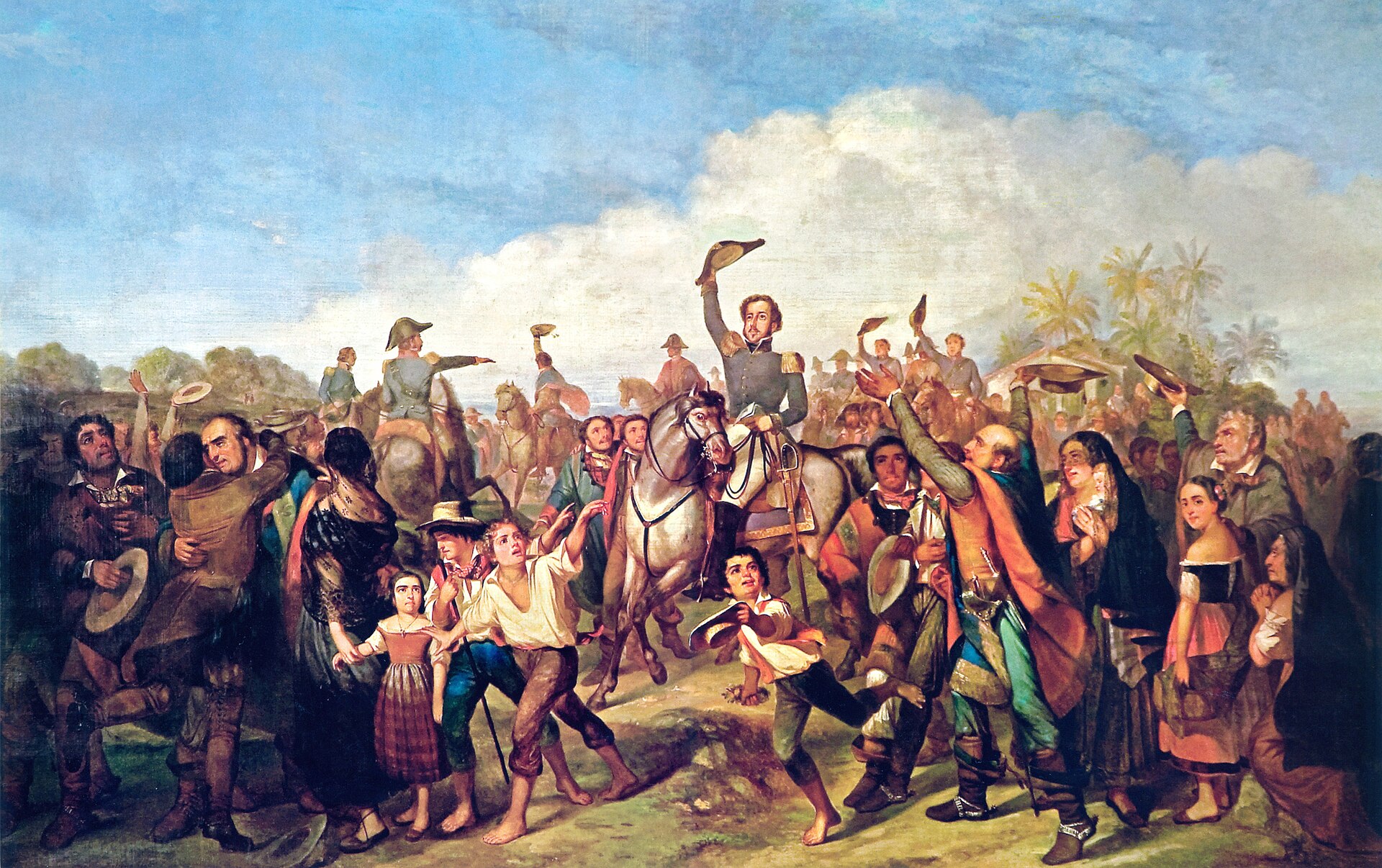 Prince Pedro proclaims himself Emperor of an independent Brazil on 7 September 1822 The Napoleonic Wars also led to the severing of the direct links between Portugal and its only American colony, Brazil. Days before Napoleon invaded Portugal, in 1807 the Portuguese royal court fled to Brazil. In 1820 there was a Constitutionalist Revolution in Portugal, which led to the return of the Portuguese court to Lisbon. This led to distrust between the Portuguese and the Brazilian colonists, and finally, in 1822, to the colony becoming independent as the Empire of Brazil, which later became a republic. British Empire Main article: British Empire The emergence of Indigenous political parties was especially characteristic of the British Empire, which seemed less ruthless than, for example, Belgium, in controlling political dissent. Driven by pragmatic demands of budgets and manpower the British made deals with the local politicians. Across the empire, the general protocol was to convene a constitutional conference in London to discuss the transition to greater self-government and then independence, submit a report of the constitutional conference to parliament, if approved submit a bill to Parliament at Westminster to terminate the responsibility of the United Kingdom (with a copy of the new constitution annexed), and finally, if approved, issuance of an Order of Council fixing the exact date of independence.[35] After World War I, several former German and Ottoman territories in the Middle East, Africa, and the Pacific were governed by the UK as League of Nations mandates. Some were administered directly by the UK, and others by British dominions – Nauru and the Territory of New Guinea by Australia, South West Africa by the Union of South Africa, and Western Samoa by New Zealand. 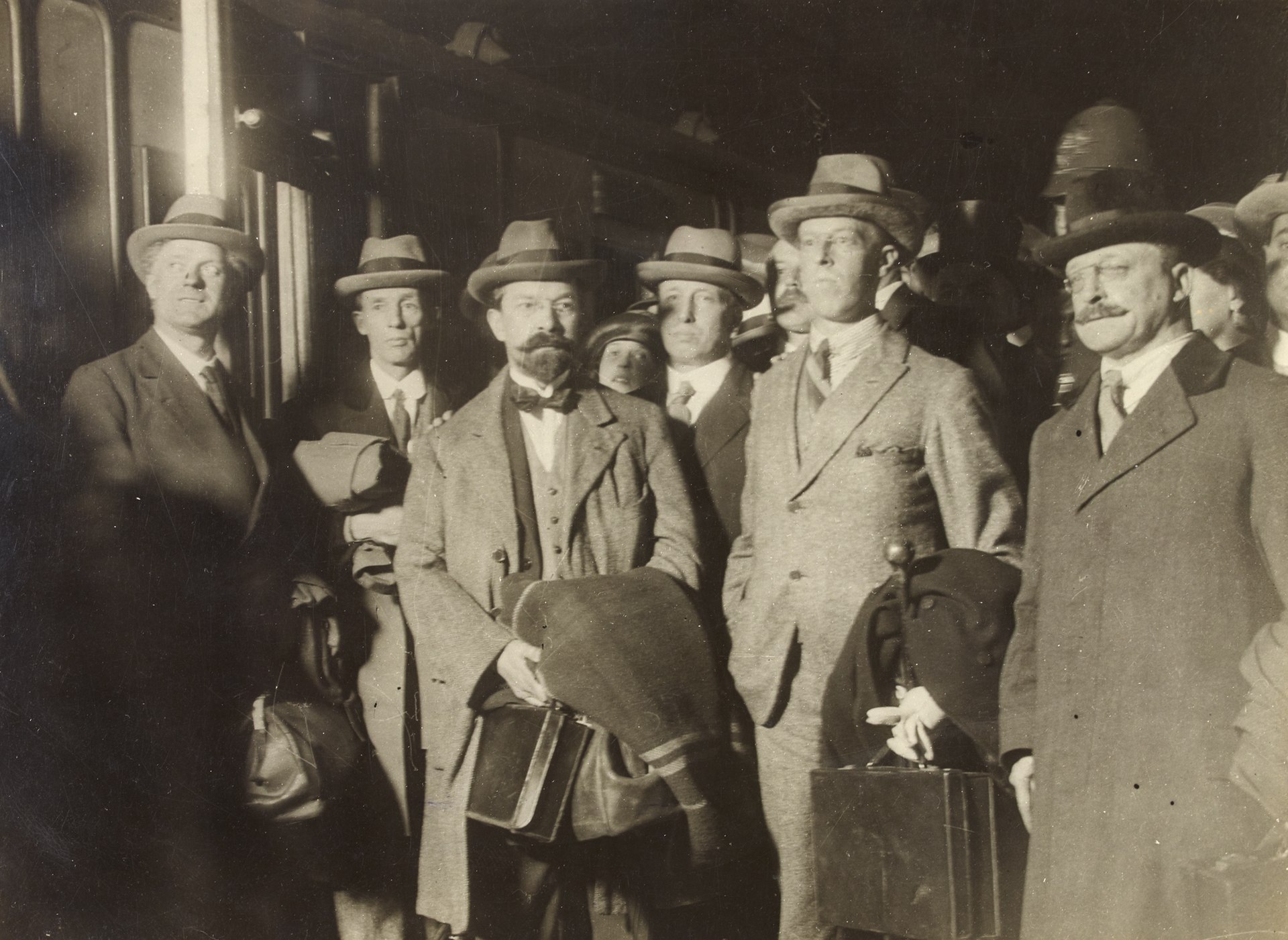 Members of the Irish delegation for the Anglo-Irish Treaty negotiations in December 1921 Egypt became independent in 1922, although the UK retained security prerogatives, control of the Suez Canal, and effective control of the Anglo-Egyptian Sudan. The Balfour Declaration of 1926 declared the British Empire dominions as equals, and the 1931 Statute of Westminster established full legislative independence for them. The equal dominions were six– Canada, Newfoundland, Australia, the Irish Free State, New Zealand, and the Union of South Africa; Ireland had been brought into a union with Great Britain in 1801 creating the United Kingdom of Great Britain and Ireland until the formation of the Irish Free State in 1922. However, some of the Dominions were already independent de facto, and even de jure and recognized as such by the international community. Thus, Canada was a founding member of the League of Nations in 1919 and served on the council from 1927 to 1930.[36] That country also negotiated on its own and signed bilateral and multilateral treaties and conventions from the early 1900s onward. Newfoundland ceded self-rule back to London in 1934. Iraq, a League of Nations mandate, became independent in 1932. In response to a growing Indian independence movement, the UK made successive reforms to the British Raj, culminating in the Government of India Act (1935). These reforms included creating elected legislative councils in some of the provinces of British India. Mohandas Karamchand Gandhi, India's independence movement leader, led a peaceful resistance to British rule. By becoming a symbol of both peace and opposition to British imperialism, many Indians began to view the British as the cause of India's problems leading to a newfound sense of nationalism among its population. With this new wave of Indian nationalism, Gandhi was eventually able to garner the support needed to push back the British and create an independent India in 1947.[37] 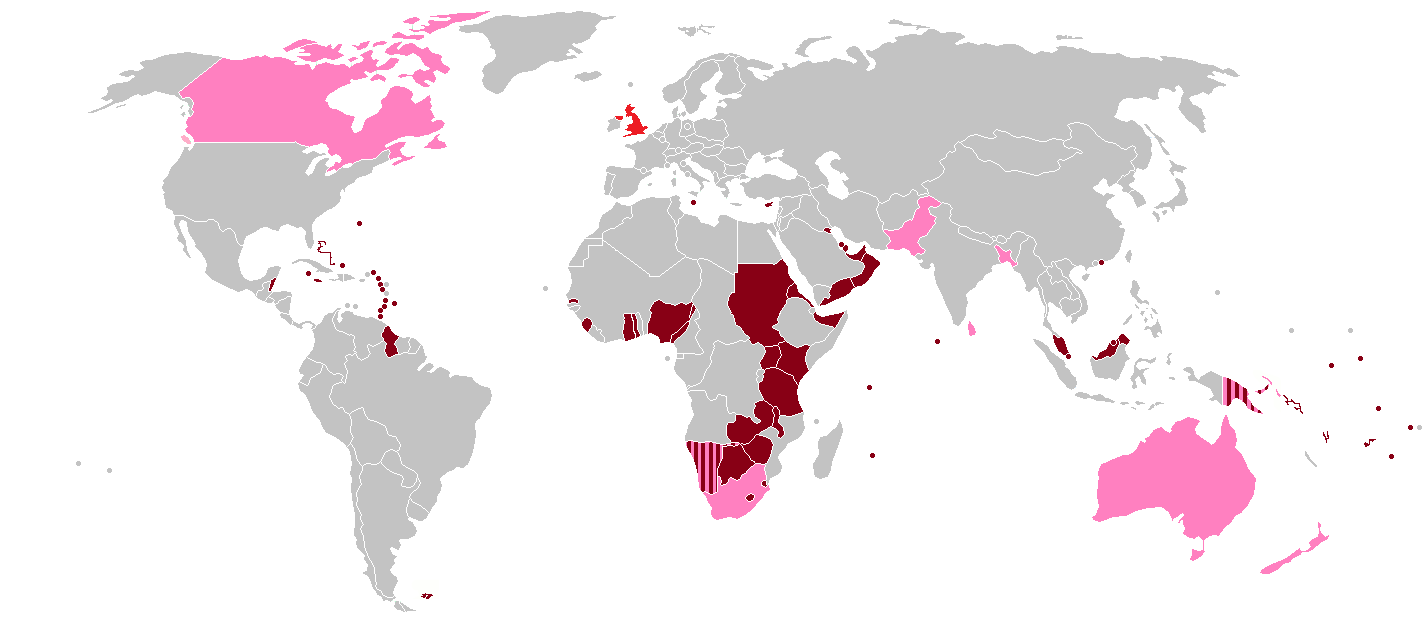 British Empire in 1952 Africa was only fully drawn into the colonial system at the end of the 19th century. In the north-east the continued independence of the Ethiopian Empire remained a beacon of hope to pro-independence activists. However, with the anti-colonial wars of the 1900s (decade) barely over, new modernizing forms of Africa nationalism began to gain strength in the early 20th century with the emergence of Pan-Africanism, as advocated by the Jamaican journalist Marcus Garvey (1887–1940) whose widely distributed newspapers demanded swift abolition of European imperialism, as well as republicanism in Egypt. Kwame Nkrumah (1909–1972) who was inspired by the works of Garvey led Ghana to independence from colonial rule. Independence for the colonies in Africa began with the independence of Sudan in 1956, and Ghana in 1957. All of the British colonies on mainland Africa became independent by 1966, although Rhodesia's unilateral declaration of independence in 1965 was not recognized by the UK or internationally. Some of the British colonies in Asia were directly administered by British officials, while others were ruled by local monarchs as protectorates or in subsidiary alliance with the UK. In 1947, British India was partitioned into the independent dominions of India and Pakistan. Hundreds of princely states, states ruled by monarchs in a treaty of subsidiary alliance with Britain, were integrated into India and Pakistan. India and Pakistan fought several wars over the former princely state of Jammu and Kashmir. French India was integrated into India between 1950 and 1954, and India annexed Portuguese India in 1961, and the Kingdom of Sikkim merged with India by popular vote in 1975. Violence, civil warfare, and partition 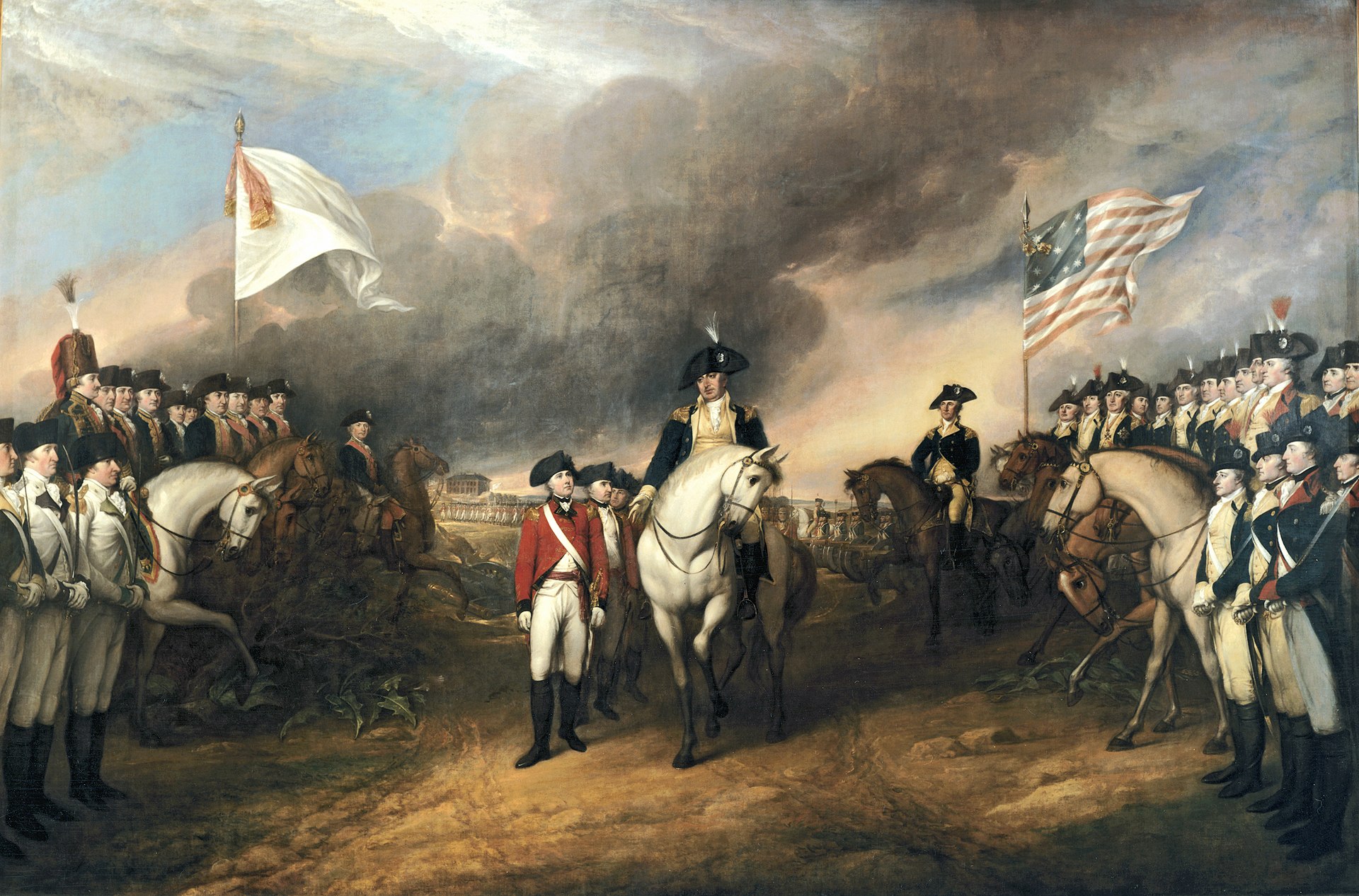 Surrender of Lord Cornwallis at Yorktown in 1781 Significant violence was involved in several prominent cases of decolonization of the British Empire; partition was a frequent solution. In 1783, the North American colonies were divided between the independent United States, and British North America, which later became Canada. The Indian Rebellion of 1857 was a revolt of a portion of the Indian Army. It was characterized by massacres of civilians on both sides. It was not a movement for independence, however, and only a small part of India was involved. In the aftermath, the British pulled back from modernizing reforms of Indian society, and the level of organised violence under the British Raj was relatively small. Most of that was initiated by repressive British administrators, as in the Amritsar massacre of 1919, or the police assaults on the Salt March of 1930.[38] Large-scale communal violence broke out between Muslims and Hindus and Muslims and Sikhs after the British left in 1947 in the newly independent dominions of India and Pakistan. Much later, in 1970, further communal violence broke out within Pakistan in the detached eastern part of East Bengal, which became independent as Bangladesh in 1971. Cyprus, which came under full British control in 1914 from the Ottoman Empire, was culturally divided between the majority Greek element (which demanded "enosis" or union with Greece) and the minority Turks. London for decades assumed it needed the island to defend the Suez Canal; but after the Suez crisis of 1956, that became a minor factor, and Greek violence became a more serious issue. Cyprus became an independent country in 1960, but ethnic violence escalated until 1974 when Turkey invaded and partitioned the island. Each side rewrote its own history, blaming the other.[39] Palestine became a British mandate from the League of Nations after World War I, initially including Transjordan. During that war, the British gained support from Jews and Arabs by making promises to both (see Balfour Declaration and McMahon–Hussein Correspondence). Decades of ethno—religious violence reached a climax with the UN Partition Plan and the ensuing war. The British eventually pulled out, and the former Mandate territory was divided between Israel, Jordan and Egypt.[40] French Empire Further information: French colonial empire 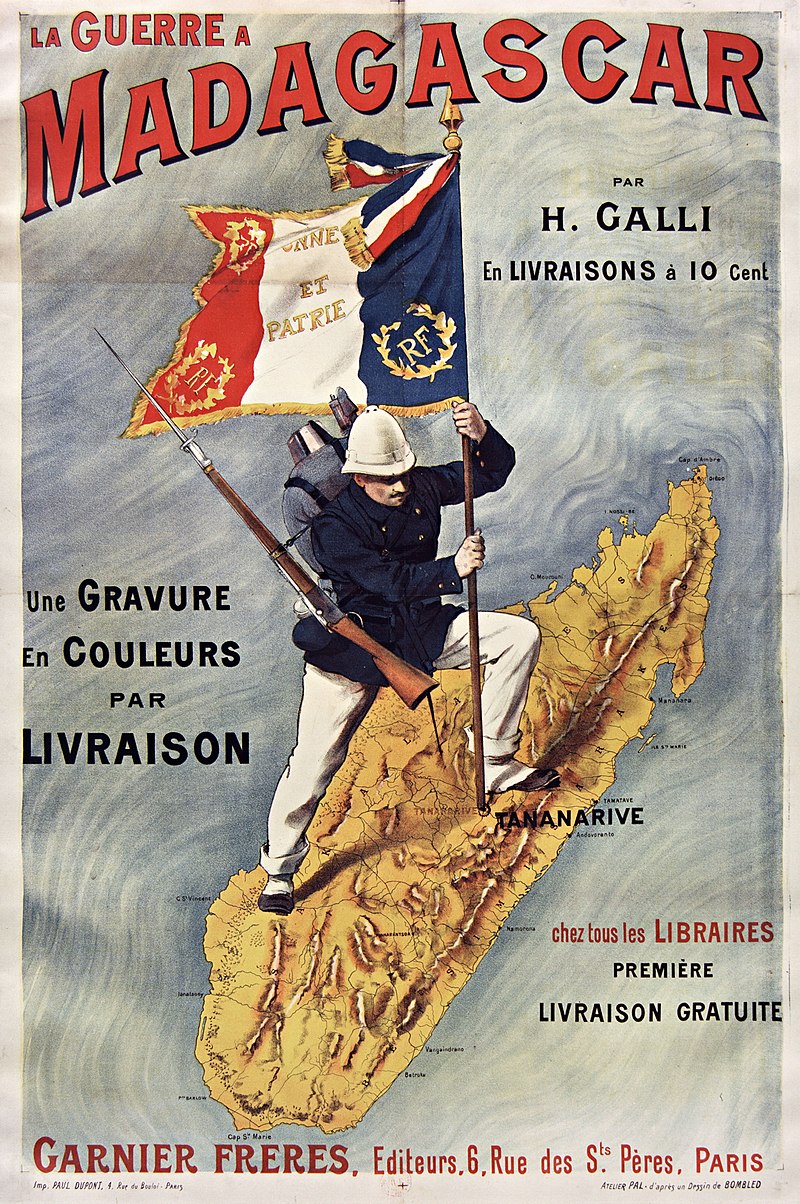 French poster about the "Madagascar War" After World War I, the colonized people were frustrated at France's failure to recognize the effort provided by the French colonies (resources, but more importantly colonial troops – the famous tirailleurs). Although in Paris the Great Mosque of Paris was constructed as recognition of these efforts, the French state had no intention to allow self-rule, let alone grant independence to the colonized people. Thus, nationalism in the colonies became stronger in between the two wars, leading to Abd el-Krim's Rif War (1921–1925) in Morocco and to the creation of Messali Hadj's Star of North Africa in Algeria in 1925. However, these movements would gain full potential only after World War II. After World War I, France administered the former Ottoman territories of Syria and Lebanon, and the former German colonies of Togoland and Cameroon, as League of Nations mandates. Lebanon declared its independence in 1943, and Syria in 1945. In some instances, decolonization efforts ran counter to other concerns, such as the rapid increase of antisemitism in Algeria in the course of the nation's resistance to French rule.[41] Although France was ultimately a victor of World War II, Nazi Germany's occupation of France and its North African colonies during the war had disrupted colonial rule. On 27 October 1946, France adopted a new constitution creating the Fourth Republic, and substituted the French Union for the colonial empire. However power over the colonies remained concentrated in France, and the power of local assemblies outside France was extremely limited. On the night of 29 March 1947, a Madagascar nationalist uprising led the French government headed by Paul Ramadier (Socialist) to violent repression: one year of bitter fighting, 11,000–40,000 Malagasy died. 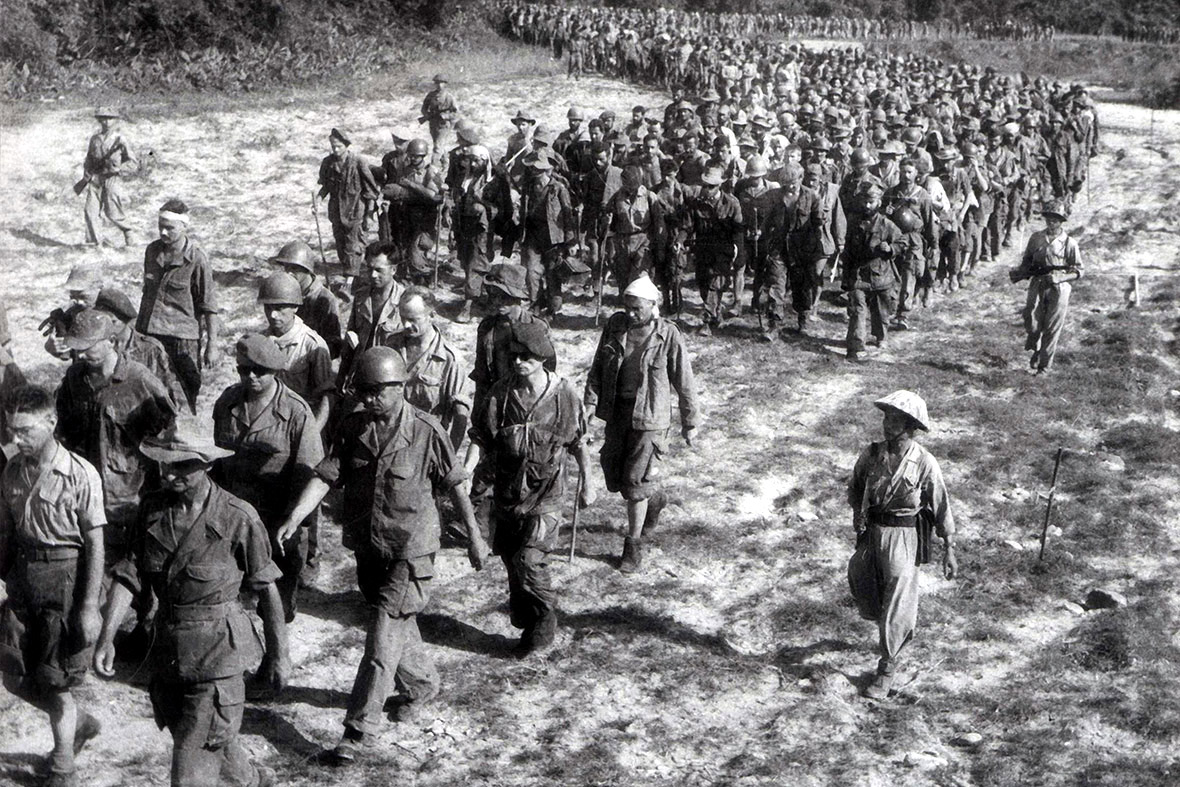 Captured French soldiers from Điện Biên Phủ, escorted by Vietnamese troops, 1954 In 1946, the states of French Indochina withdrew from the French Union, leading to the Indochina War (1946–54). Cambodia and Laos became independent in 1953, and the 1954 Geneva Accords ended France's occupation of Indochina, leaving South Vietnam independent and North Vietnam independence recognized. In 1956, Morocco and Tunisia gained their independence from France. In 1960, eight independent countries emerged from French West Africa, and five from French Equatorial Africa. The Algerian War of Independence raged from 1954 to 1962. To this day, the Algerian war – officially called a "public order operation" until the 1990s – remains a trauma for both France and Algeria. Philosopher Paul Ricœur has spoken of the necessity of a "decolonisation of memory", starting with the recognition of the 1961 Paris massacre during the Algerian war, and the decisive role of African and especially North African immigrant manpower in the Trente Glorieuses post–World War II economic growth period. In the 1960s, due to economic needs for post-war reconstruction and rapid economic growth, French employers actively sought to recruit manpower from the colonies, explaining today's multiethnic population. After 1918 Further information: New Imperialism United States Main articles: American imperialism and Timeline of United States military operations 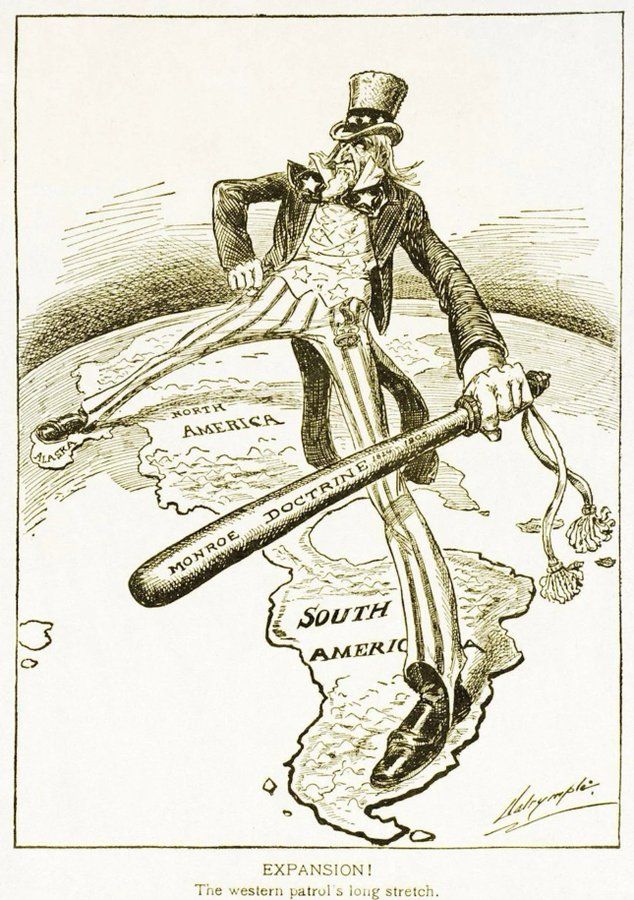 A union of former colonies itself, the United States approached imperialism differently from the other Powers. Much of its energy and rapidly expanding population was directed westward across the North American continent against English and French claims, the Spanish Empire and Mexico. The Native Americans were sent to reservations, often unwillingly. With support from Britain, its Monroe Doctrine reserved the Americas as its sphere of interest, prohibiting other states (particularly Spain) from recolonizing the newly independent polities of Latin America. However, France, taking advantage of the American government's distraction during the Civil War, intervened militarily in Mexico and set up a French-protected monarchy. Spain took the step to occupy the Dominican Republic and restore colonial rule. The Union victory in the Civil War in 1865 forced both France and Spain to accede to American demands to evacuate those two countries. America's only African colony, Liberia, was formed privately and achieved independence early; Washington unofficially protected it. By 1900, the U.S. advocated an Open Door Policy and opposed the direct division of China.[42] 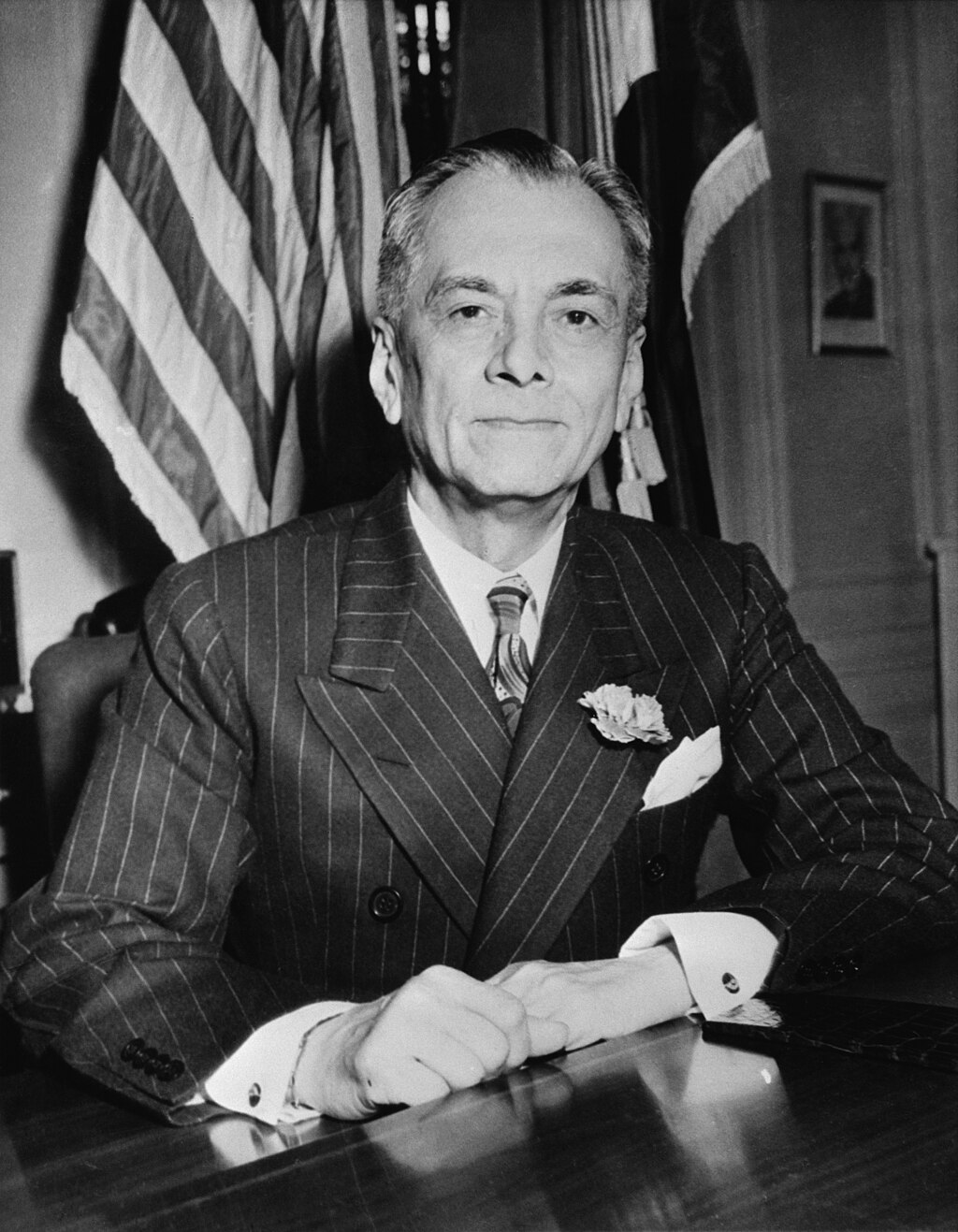 Manuel L. Quezón, the first president of the Commonwealth of the Philippines (from 1935 to 1944) 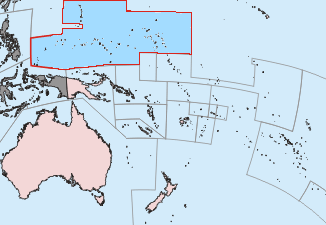 Trust Territory of the Pacific Islands in Micronesia administered by the United States from 1947 to 1986 After 1898 direct intervention expanded in Latin America. The United States purchased Alaska from the Russian Empire in 1867 and annexed Hawaii in 1898. Following the Spanish–American War in 1898, the US added most of Spain's remaining colonies: Puerto Rico, Philippines, and Guam. Deciding not to annex Cuba outright, the U.S. established it as a client state with obligations including the perpetual lease of Guantánamo Bay to the U.S. Navy. The attempt of the first governor to void the island's constitution and remain in power past the end of his term provoked a rebellion that provoked a reoccupation between 1906 and 1909, but this was again followed by devolution. Similarly, the McKinley administration, despite prosecuting the Philippine–American War against a native republic, set out that the Territory of the Philippine Islands was eventually granted independence.[43] In 1917, the U.S. purchased the Danish West Indies (later renamed the US Virgin Islands) from Denmark and Puerto Ricans became full U.S. citizens that same year.[44] The US government declared Puerto Rico the territory was no longer a colony and stopped transmitting information about it to the United Nations Decolonization Committee.[45] As a result, the UN General Assembly removed Puerto Rico from the U.N. list of non-self-governing territories. Four referendums showed little support for independence, but much interest in statehood such as Hawaii and Alaska received in 1959.[46] The Monroe Doctrine was expanded by the Roosevelt Corollary in 1904, providing that the United States had a right and obligation to intervene "in flagrant cases of such wrongdoing or impotence" that a nation in the Western Hemisphere became vulnerable to European control. In practice, this meant that the United States was led to act as a collections agent for European creditors by administering customs duties in the Dominican Republic (1905–1941), Haiti (1915–1934), and elsewhere. The intrusiveness and bad relations this engendered were somewhat checked by the Clark Memorandum and renounced by President Franklin D. Roosevelt's "Good Neighbor Policy". The Fourteen Points were preconditions addressed by President Woodrow Wilson to the European powers at the Paris Peace Conference following World War I. In allowing allies France and Britain the former colonial possessions of the German and Ottoman Empires, the US demanded of them submission to the League of Nations mandate, in calling for V. A free, open-minded, and absolutely impartial adjustment of all colonial claims, based upon a strict observance of the principle that in determining all such questions of sovereignty the interests of the populations concerned must have equal weight with the equitable government whose title is to be determined. See also point XII. After World War II, the U.S. poured tens of billions of dollars into the Marshall Plan, and other grants and loans to Europe and Asia to rebuild the world economy. At the same time American military bases were established around the world and direct and indirect interventions continued in Korea, Indochina, Latin America (inter alia, the 1965 occupation of the Dominican Republic), Africa, and the Middle East to oppose Communist movements and insurgencies. Since the dissolution of the Soviet Union, the United States has been far less active in the Americas, but invaded Afghanistan and Iraq following the September 11 attacks in 2001, establishing army and air bases in Central Asia. Japan 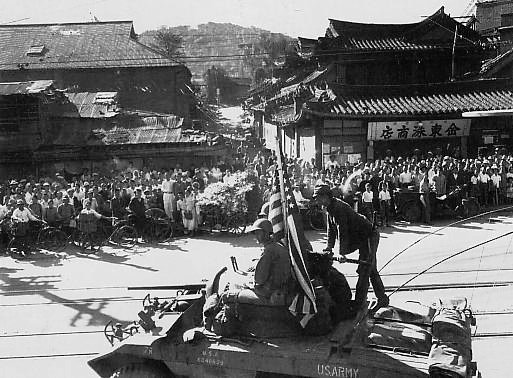 U.S. troops in Korea, September 1945 Before World War I, Japan had gained several substantial colonial possessions in East Asia such as Taiwan (1895) and Korea (1910). Japan joined the allies in World War I, and after the war acquired the South Seas Mandate, the former German colony in Micronesia, as a League of Nations Mandate. Pursuing a colonial policy comparable to those of European powers, Japan settled significant populations of ethnic Japanese in its colonies while simultaneously suppressing Indigenous ethnic populations by enforcing the learning and use of the Japanese language in schools. Other methods such as public interaction, and attempts to eradicate the use of Korean, Hokkien, and Hakka among the Indigenous peoples, were seen to be used. Japan also set up the Imperial Universities in Korea (Keijō Imperial University) and Taiwan (Taihoku Imperial University) to compel education. In 1931, Japan seized Manchuria from the Republic of China, setting up a puppet state under Puyi, the last Manchu emperor of China. In 1933 Japan seized the Chinese province of Rehe, and incorporated it into its Manchurian possessions. The Second Sino-Japanese War started in 1937, and Japan occupied much of eastern China, including the Republic's capital at Nanjing. An estimated 20 million Chinese died during the 1931–1945 war with Japan.[47] In December 1941, the empire of Japan joined World War II by invading the European and U.S. colonies in Southeast Asia and the Pacific, including French Indochina, Hong Kong, the Philippines, Burma, Malaya, Indonesia, Portuguese Timor, and others. Following its surrender to the Allies in 1945, Japan was deprived of all its colonies with a number of them being returned to the original colonizing Western powers. The Soviet Union declared war on Japan in August 1945, and shortly after occupied and annexed the southern Kuril Islands, which Japan still claims. After 1945 Planning for decolonization U.S. and Philippines In the United States, the two major parties were divided on the acquisition of the Philippines, which became a major campaign issue in 1900. The Republicans, who favored permanent acquisition, won the election, but after a decade or so, Republicans turned their attention to the Caribbean, focusing on building the Panama Canal. President Woodrow Wilson, a Democrat in office from 1913 to 1921, ignored the Philippines, and focused his attention on Mexico and Caribbean nations. By the 1920s, the peaceful efforts by the Filipino leadership to pursue independence proved convincing. When the Democrats returned to power in 1933, they worked with the Filipinos to plan a smooth transition to independence. It was scheduled for 1946 by Tydings–McDuffie Act of 1934. In 1935, the Philippines transitioned out of territorial status, controlled by an appointed governor, to the semi-independent status of the Commonwealth of the Philippines. Its constitutional convention wrote a new constitution, which was approved by Washington and went into effect, with an elected governor Manuel L. Quezon and legislature. Foreign Affairs remained under American control. The Philippines built up a new army, under general Douglas MacArthur, who took leave from his U.S. Army position to take command of the new army reporting to Quezon. The Japanese occupation 1942 to 1945 disrupted but did not delay the transition. It took place on schedule in 1946 as Manuel Roxas took office as president.[48] Portugal 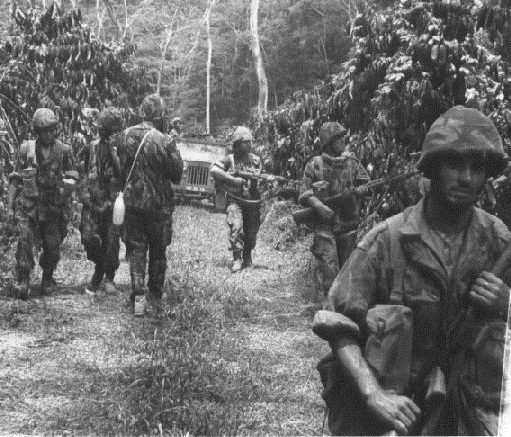 Portuguese Army special caçadores advancing in the African jungle in the early 1960s, during the Angolan War of Independence. As a result of its pioneering discoveries, Portugal had a large and particularly long-lasting colonial empire which had begun in 1415 with the conquest of Ceuta and ended only in 1999 with the handover of Portuguese Macau to China. In 1822, Portugal lost control of Brazil, its largest colony. From 1933 to 1974, Portugal was an authoritarian state (ruled by António de Oliveira Salazar). The regime was fiercely determined to maintain the country's colonial possessions at all costs and to aggressively suppress any insurgencies. In 1961, India annexed Goa and by the same year nationalist forces had begun organizing in Portugal. Revolts (preceding the Portuguese Colonial War) spread to Angola, Guinea Bissau and Mozambique.[49] Lisbon escalated its effort in the war: for instance, it increased the number of natives in the colonial army and built strategic hamlets. Portugal sent another 300,000 European settlers into Angola and Mozambique before 1974. That year, a left-wing revolution inside Portugal overthrew the existing regime and encouraged pro-Soviet elements to attempt to seize control in the colonies. The result was a very long and extremely difficult multi-party Civil War in Angola, and lesser insurrections in Mozambique.[50] Belgium Belgium's empire began with the annexation of the Congo in 1908 in response to international pressure to bring an end to the terrible atrocities that had taken place under King Leopold's privately run Congo Free State. It added Rwanda and Burundi as League of Nations mandates from the former German Empire in 1919. The colonies remained independent during the war, while Belgium was occupied by the Germans. There was no serious planning for independence, and exceedingly little training or education provided. The Belgian Congo was especially rich, and many Belgian businessmen lobbied hard to maintain control. Local revolts grew in power and finally, the Belgian king suddenly announced in 1959 that independence was on the agenda – and it was hurriedly arranged in 1960, for country bitterly and deeply divided on social and economic grounds.[51] Netherlands 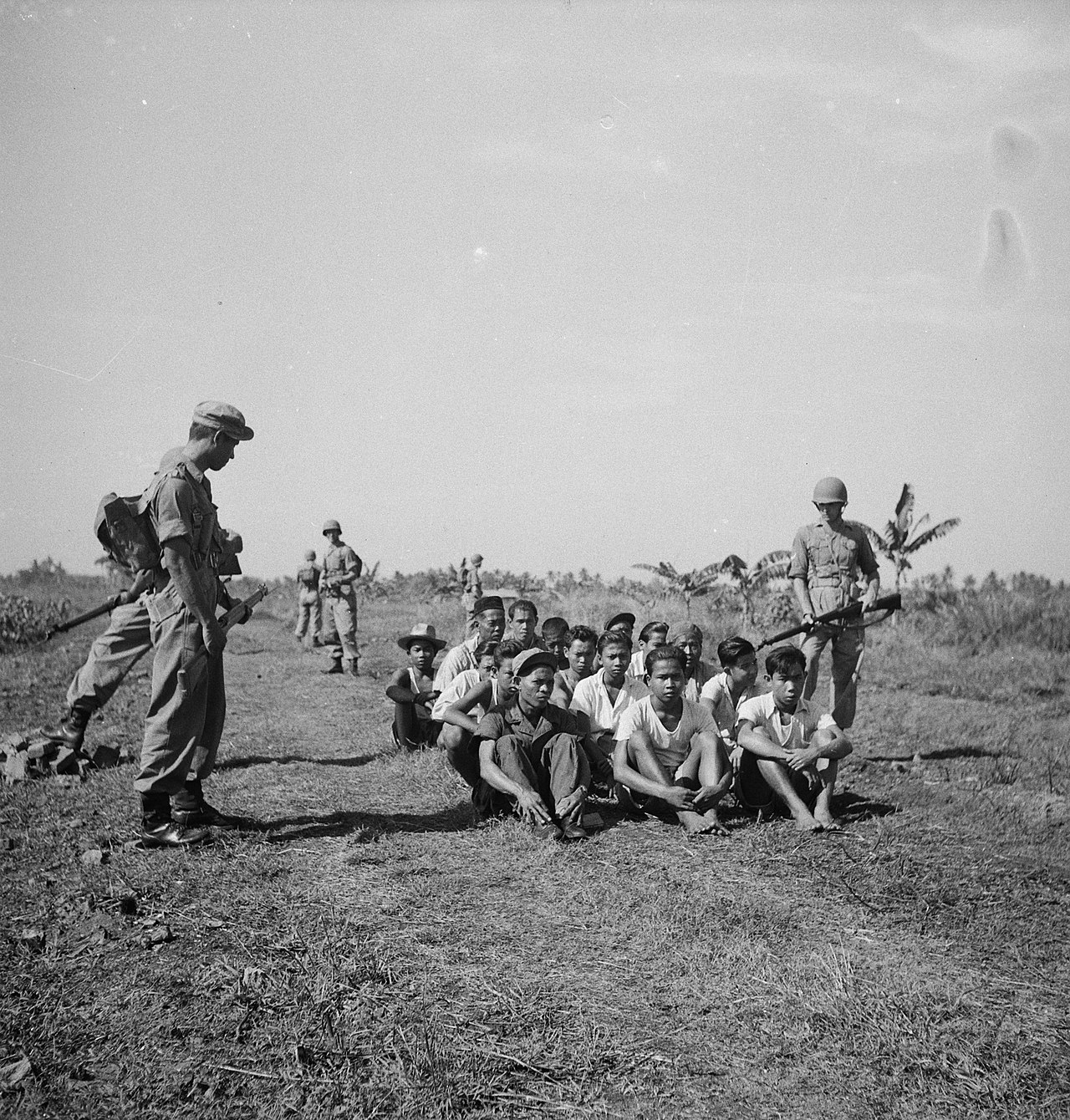 Dutch soldiers in the East Indies during the Indonesian National Revolution, 1946 The Netherlands had spent centuries building up its empire. By 1940 it consisted mostly of the Dutch East Indies, corresponding to what is now Indonesia. Its massive oil reserves provided about 14 percent of the Dutch national product and supported a large population of ethnic Dutch government officials and businessmen in Batavia (now Jakarta) and other major cities. The Netherlands was overrun and almost starved to death by the Nazis during the war, and Japan sank the Dutch fleet in seizing the East Indies. In 1945 the Netherlands could not regain these islands on its own; it did so by depending on British military help and American financial grants. By the time Dutch soldiers returned, an independent government under Sukarno was in power, originally set up by the Empire of Japan. The Dutch both abroad and at home generally agreed that Dutch power depended on an expensive war to regain the islands. Compromises were negotiated, but were trusted by neither side. When the Indonesian Republic successfully suppressed a large-scale communist revolt, the United States realized that it needed the nationalist government as an ally in the Cold War. Dutch possession was an obstacle to American Cold War goals, so Washington forced the Dutch to grant full independence. A few years later, Sukarno nationalized all Dutch East Indies properties and expelled all ethnic Dutch—over 300,000—as well as several hundred thousand ethnic Indonesians who supported the Dutch cause. In the aftermath, the Netherlands prospered greatly in the 1950s and 1960s but nevertheless public opinion was bitterly hostile to the United States for betrayal. The Dutch government eventually gave up on claims to Indonesian sovereignty in 1949, after American pressure.[52][53] The Netherlands also had one other major colony, Dutch Guiana in South America, which became independent as Suriname in 1975. United Nations trust territories Main article: United Nations trust territories When the United Nations was formed in 1945, it established trust territories. These territories included the League of Nations mandate territories which had not achieved independence by 1945, along with the former Italian Somaliland. The Trust Territory of the Pacific Islands was transferred from Japanese to US administration. By 1990 all but one of the trust territories had achieved independence, either as independent states or by merger with another independent state; the Northern Mariana Islands elected to become a commonwealth of the United States. The emergence of the Third World (1945–present) 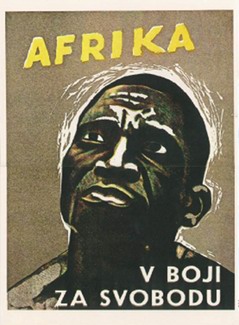 Czechoslovak anti-colonialist propaganda poster: "Africa – in fight for freedom" Newly independent states organised themselves in order to oppose continued economic colonialism by former imperial powers. The Non-Aligned Movement constituted itself around the main figures of Jawaharlal Nehru, the first Prime Minister of India, Sukarno, the Indonesian president, Josip Broz Tito the Communist leader of Yugoslavia, and Gamal Abdel Nasser, head of Egypt.[54][55][56] In 1955 these leaders gathered at the Bandung Conference along with Sukarno, the leader of Indonesia, and Zhou Enlai, Premier of the People's Republic of China.[57][58] In 1960, the UN General Assembly voted on the Declaration on the Granting of Independence to Colonial Countries and Peoples. The next year, the first Non-Aligned Movement conference was held in Belgrade (1961),[59] and was followed in 1964 by the creation of the United Nations Conference on Trade and Development (UNCTAD) which tried to promote a New International Economic Order (NIEO).[60][61] The NIEO was opposed to the 1944 Bretton Woods system, which had benefited the leading states which had created it, and remained in force until 1971 after the United States' suspension of convertibility from dollars to gold. The main principles of the NIEO are: The sovereign equality of all States, with non-interference in their internal affairs, their effective participation in solving world problems and the right to adopt their own economic and social systems; Full sovereignty of each State over its natural resources and other economic activities necessary for development, as well as regulation of transnational corporations; Just and equitable relationship between the price of raw materials and other goods exported by developing countries, and the prices of raw materials and other goods exported by the developed countries; Strengthening of bilateral and multilateral international assistance to promote industrialization in the developing countries through, in particular, the provisioning of sufficient financial resources and opportunities for transfer of appropriate techniques and technologies.[62] 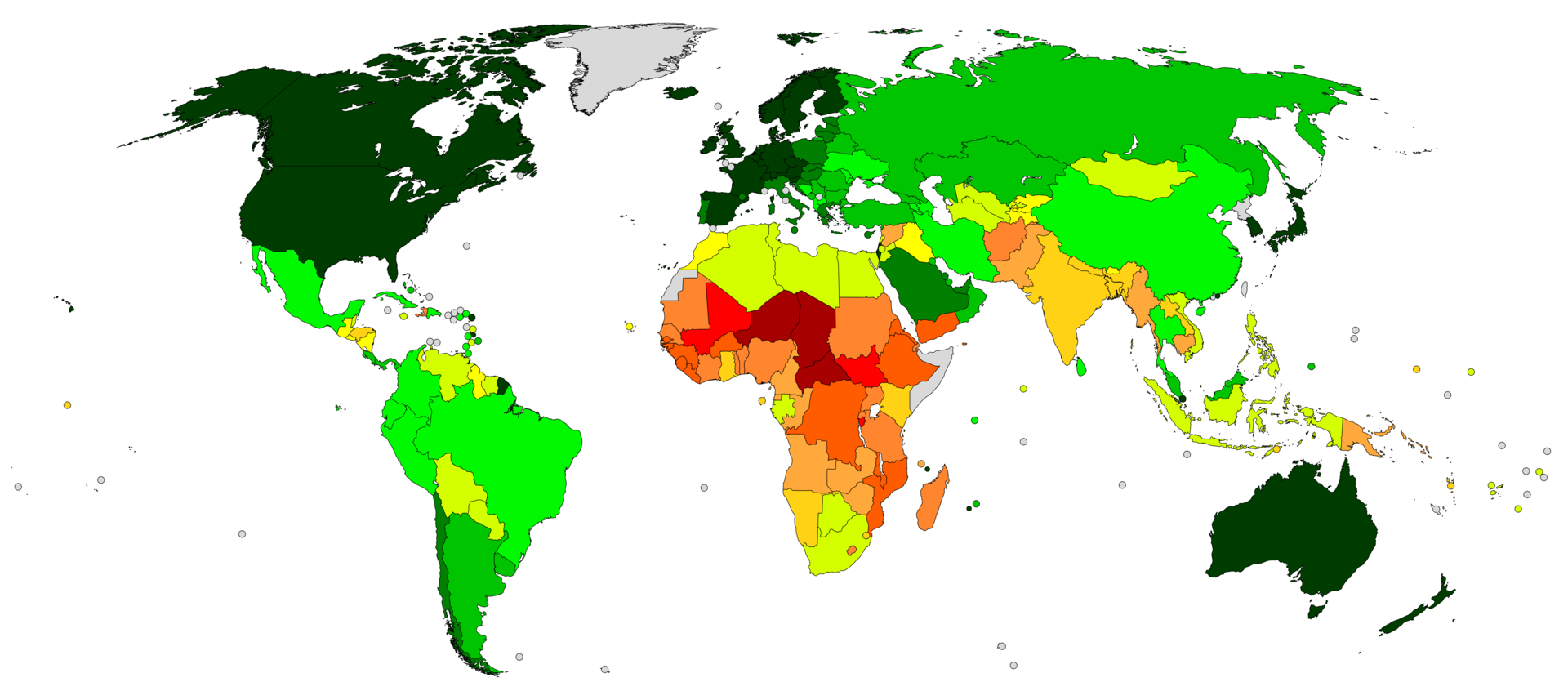 The UN Human Development Index (HDI) is a quantitative index of development, an alternative to the classic Gross Domestic Product (GDP), which some use as a proxy to define the Third World. While the GDP only calculates economic wealth, the HDI includes life expectancy, public health and literacy as fundamental factors of a good quality of life. Countries in North America, the Southern Cone, Europe, East Asia, and Oceania generally have better standards of living than countries in Central Africa, East Africa, parts of the Caribbean, and South Asia. The UNCTAD however was not very effective in implementing the NIEO, and social and economic inequalities between industrialized countries and the Third World grew throughout the 1960s until the 21st century. The 1973 oil crisis which followed the Yom Kippur War (October 1973) was triggered by the OPEC which decided an embargo against the US and Western countries, causing a fourfold increase in the price of oil, which lasted five months, starting on 17 October 1973, and ending on 18 March 1974. OPEC nations then agreed, on 7 January 1975, to raise crude oil prices by 10%. At that time, OPEC nations – including many who had recently nationalized their oil industries – joined the call for a New International Economic Order to be initiated by coalitions of primary producers. Concluding the First OPEC Summit in Algiers they called for stable and just commodity prices, an international food and agriculture program, technology transfer from North to South, and the democratization of the economic system. But industrialized countries quickly began to look for substitutes to OPEC petroleum, with the oil companies investing the majority of their research capital in the US and European countries or others, politically sure countries. The OPEC lost more and more influence on the world prices of oil. The second oil crisis occurred in the wake of the 1979 Iranian Revolution. Then, the 1982 Latin American debt crisis exploded in Mexico first, then Argentina and Brazil, which proved unable to pay back their debts, jeopardizing the existence of the international economic system. The 1990s were characterized by the prevalence of the Washington consensus on neoliberal policies, "structural adjustment" and "shock therapies" for the former Communist states. Decolonization of Africa Main article: Decolonisation of Africa 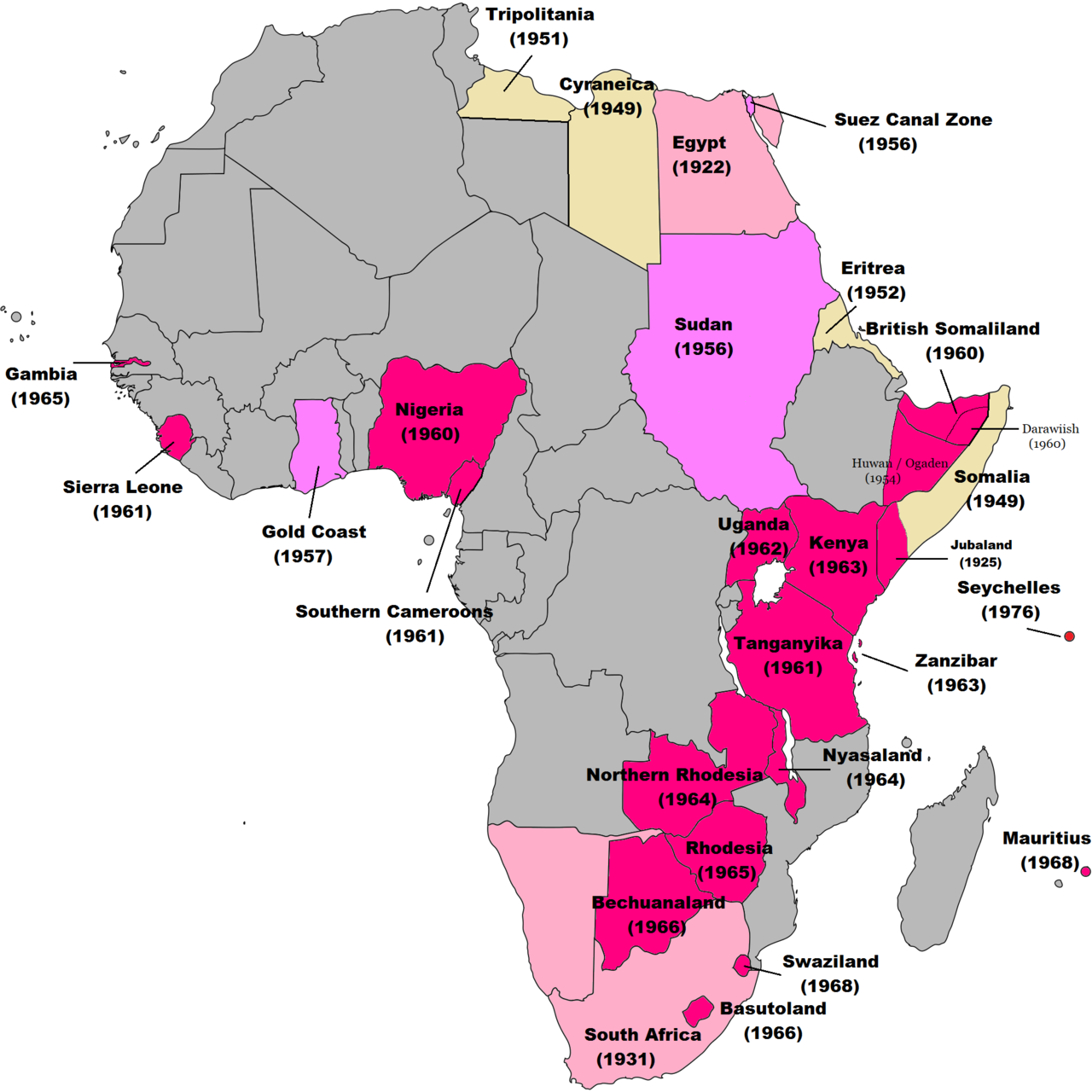 British decolonisation in Africa The decolonization of North Africa and sub-Saharan Africa took place in the mid-to-late 1950s, very suddenly, with little preparation. There was widespread unrest and organized revolts, especially in French Algeria, Portuguese Angola, the Belgian Congo and British Kenya.[63][64][65][66] In 1945, Africa had four independent countries – Egypt, Ethiopia, Liberia, and South Africa. After Italy's defeat in World War II, France and the UK occupied the former Italian colonies. Libya became an independent kingdom in 1951. Eritrea was merged with Ethiopia in 1952. Italian Somaliland was governed by the UK, and by Italy after 1954, until its independence in 1960. 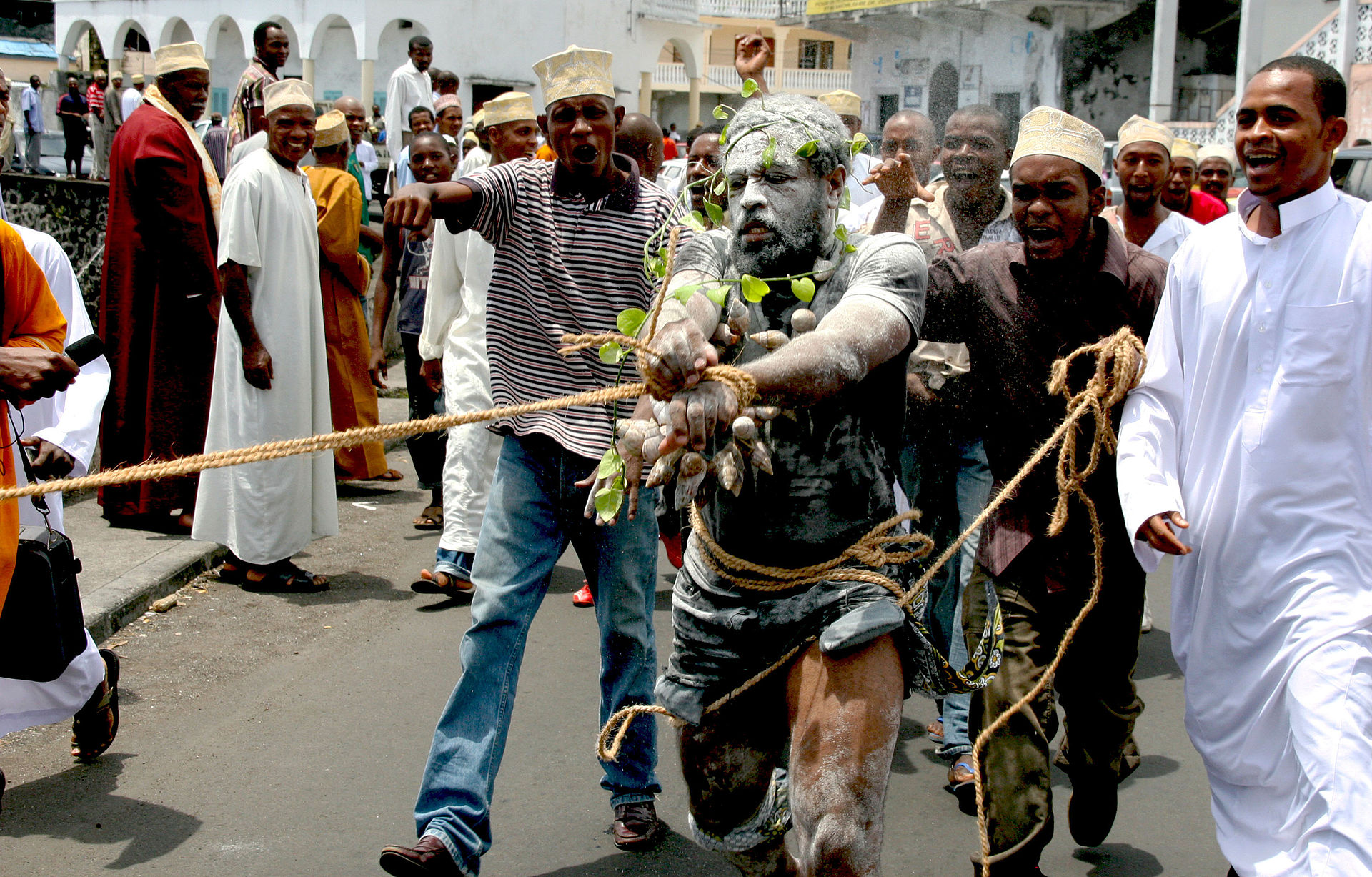 Comorians protest against Mayotte referendum on becoming an overseas department of France, 2009 By 1977, European colonial rule in mainland Africa had ended. Most of Africa's island countries had also become independent, although Réunion and Mayotte remain part of France. However the black majorities in Rhodesia and South Africa were disenfranchised until 1979 in Rhodesia, which became Zimbabwe-Rhodesia that year and Zimbabwe the next, and until 1994 in South Africa. Namibia, Africa's last UN Trust Territory, became independent of South Africa in 1990. Most independent African countries exist within prior colonial borders. However Morocco merged French Morocco with Spanish Morocco, and Somalia formed from the merger of British Somaliland and Italian Somaliland. Eritrea merged with Ethiopia in 1952, but became an independent country in 1993. Most African countries became independent as republics. Morocco, Lesotho, and Eswatini remain monarchies under dynasties that predate colonial rule. Burundi, Egypt, Libya, and Tunisia gained independence as monarchies, but all four countries' monarchs were later deposed, and they became republics. African countries cooperate in various multi-state associations. The African Union includes all 55 African states. There are several regional associations of states, including the East African Community, Southern African Development Community, and Economic Community of West African States, some of which have overlapping membership. United Kingdom: Sudan (1956); Ghana (1957); Nigeria (1960); Sierra Leone and Tanganyika (1961); Uganda (1962); Kenya and Sultanate of Zanzibar (1963); Malawi and Zambia (1964); Gambia and Rhodesia (1965); Botswana and Lesotho (1966); Mauritius and Swaziland (1968); Seychelles (1976) France: Morocco and Tunisia (1956); Guinea (1958); Cameroon, Togo, Mali, Senegal, Madagascar, Benin, Niger, Burkina Faso, Ivory Coast, Chad, Central African Republic, Republic of the Congo, Gabon and Mauritania (1960); Algeria (1962); Comoros (1975); Djibouti (1977) Spain: Equatorial Guinea (1968) Portugal: Guinea-Bissau (1974); Mozambique, Cape Verde, São Tomé and Príncipe and Angola (1975) Belgium: Democratic Republic of the Congo (1960); Burundi and Rwanda (1962) Decolonization in the Americas after 1945 Main article: Decolonization of the Americas United Kingdom: Newfoundland (formerly an independent dominion but under direct British rule since 1934) (1949, union with Canada); Jamaica and Trinidad and Tobago (1962); Barbados and Guyana (1966); Bahamas (1973); Grenada (1974); Trinidad and Tobago (1976, removal of Queen Elizabeth II as head of state, transition to republic); Dominica (1978); Saint Lucia and St. Vincent and the Grenadines (1979); Antigua and Barbuda and Belize (1981); Saint Kitts and Nevis (1983); Barbados (2021, removal of Queen Elizabeth II as head of state, transition to republic).[67] Netherlands: Netherlands Antilles, Suriname (1954, both becoming constituent countries of the Kingdom of the Netherlands), 1975 (independence of Suriname) Denmark: Greenland (1979, became an autonomous territory of the Kingdom of Denmark). Decolonization of Asia Main article: Decolonisation of Asia 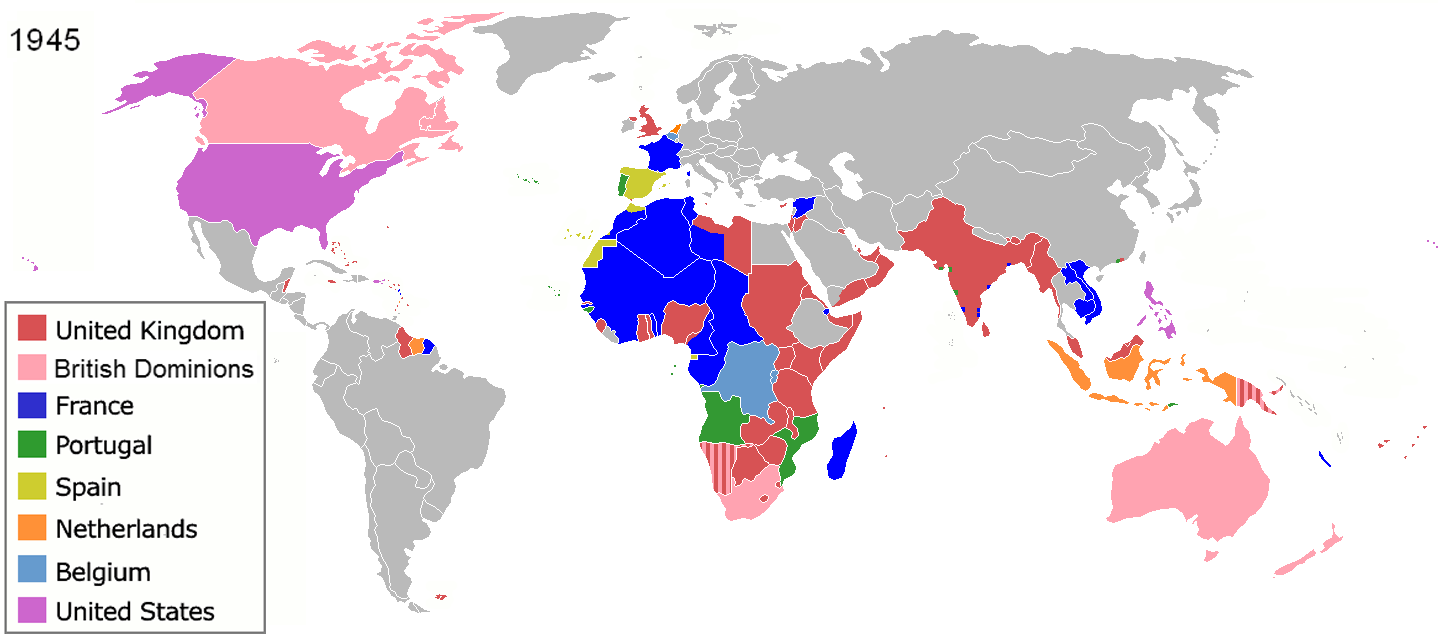 Western European colonial empires in Asia and Africa all collapsed in the years after 1945 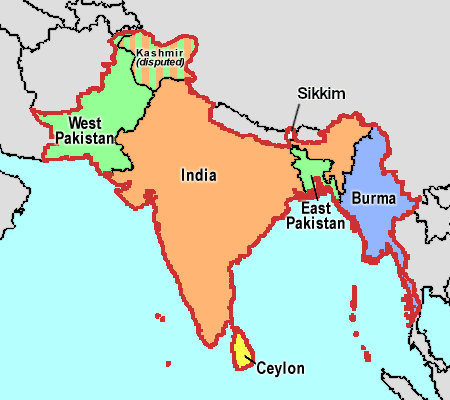 Four nations (India, Pakistan, Dominion of Ceylon, and Union of Burma) that gained independence in 1947 and 1948 Japan expanded its occupation of Chinese territory during the 1930s, and occupied Southeast Asia during World War II. After the war, the Japanese colonial empire was dissolved, and national independence movements resisted the re-imposition of colonial control by European countries and the United States. The Republic of China regained control of Japanese-occupied territories in Manchuria and eastern China, as well as Taiwan. Only Hong Kong and Macau remained in outside control until both places were transferred to the People's Republic of China by the UK and Portugal in 1997 and 1999. The Allied powers divided Korea into two occupation zones, which became the states of North Korea and South Korea. The Philippines became independent of the U.S. in 1946. The Netherlands recognized Indonesia's independence in 1949, after a four-year independence struggle. Indonesia annexed Netherlands New Guinea in 1963, and Portuguese Timor in 1975. In 2002, former Portuguese Timor became independent as East Timor. The following list shows the colonial powers following the end of hostilities in 1945, and their colonial or administrative possessions. The year of decolonization is given chronologically in parentheses.[68] United Kingdom: Transjordan (1946), British India and Pakistan (1947); British Mandate of Palestine, Burma and Ceylon (1948); British Malaya (1957); Kuwait (1961); Kingdom of Sarawak, North Borneo and Singapore (1963); Maldives (1965); Aden (1967); Bahrain, Qatar and United Arab Emirates (1971); Brunei (1984); Hong Kong (1997) France: French India (1954) and Indochina comprising Vietnam (1954), Cambodia (1953) and Laos (1953) Portugal: Portuguese India (1961); East Timor (1975); Macau (1999) United States: Philippines (1946) Netherlands: Indonesia (1949) Decolonization in Europe 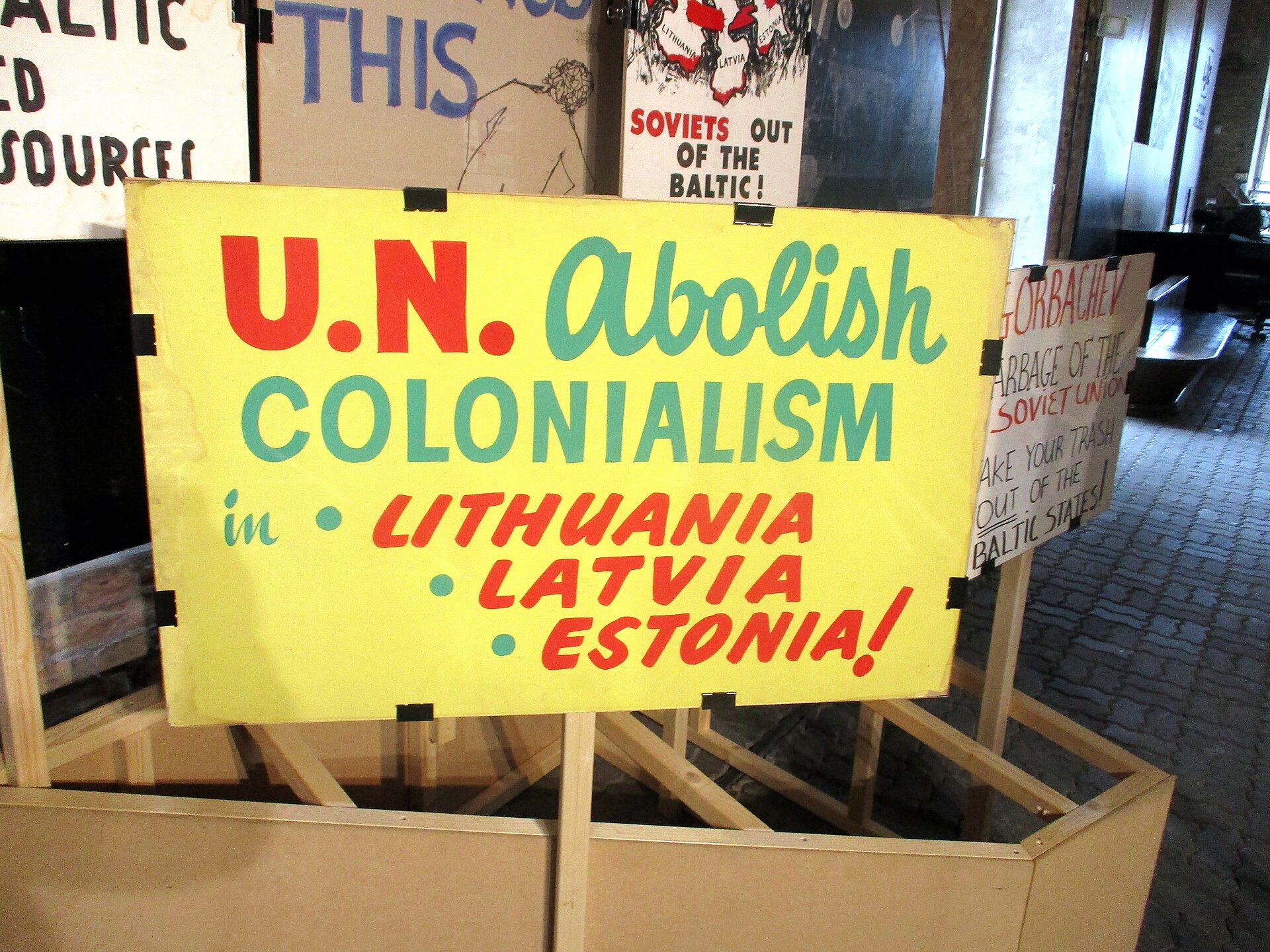 A protest sign from the second half of the 20th century calling on the U.N. to abolish Soviet colonialism in the Baltic states. Italy had occupied the Dodecanese islands in 1912, but Italian occupation ended after World War II, and the islands were integrated into Greece. British rule ended in Cyprus in 1960, and Malta in 1964, and both islands became independent republics. Soviet control of its non-Russian member republics weakened as movements for democratization and self-government gained strength during the late 1980s, and four republics declared independence in 1990 and 1991. The Soviet coup d'état attempt in August 1991 accelerated the breakup of the USSR, which formally ended on 26 December 1991. The Republics of the Soviet Union became sovereign states—Armenia, Azerbaijan, Belarus (formerly called Byelorussia,) Estonia, Georgia, Kazakhstan, Kyrgyzstan, Latvia, Lithuania, Moldova, Russia, Tajikistan, Turkmenistan, Ukraine and Uzbekistan. Historian Robert Daniels says, "A special dimension that the anti-Communist revolutions shared with some of their predecessors was decolonization."[69] Moscow's policy had long been to settle ethnic Russians in the non-Russian republics. After independence, minority rights have been an issue for Russian-speakers in some republics and for non-Russian-speakers in Russia; see Russians in the Baltic states.[70] Meanwhile, the Russian Federation continues to apply political, economic, and military pressure on former Soviet colonies. In 2014, it annexed Ukraine's Crimean peninsula, the first such action in Europe since the end of the Second World War. In March 2023, following the 2022 Russian invasion and subsequent Russian occupation of parts of Ukraine, Ukraine passed a law that did forbid to have toponymy with names associated with Russian ("the occupying state").[71] This law in particular has been described by Ukrainian media as providing "a legitimate framework and effective mechanisms" for the decolonization of Ukraine.[72] After the 2022 Russian invasion, scholars of Eastern Europe and Central Asia Studies ("Russian studies") have renewed awareness of Russian colonialism and interest in decolonizing scholarship in their field,[73][74] with academic conferences organized on the theme by the Centre for Baltic and East European Studies (CBEES) in Stockholm in December 2022,[75] the British Association for Slavonic and Eastern European Studies (BASEES) in April 2023,[76] the Aleksanteri Institute in October,[77] and the Association for Slavic, East European, and Eurasian Studies (ASEEES) in Philadelphia in November–December. Decolonization of Oceania Main article: Decolonisation of Oceania The decolonization of Oceania occurred after World War II when nations in Oceania achieved independence by transitioning from European colonial rule to full independence. United Kingdom: Tonga and Fiji (1970); Solomon Islands and Tuvalu (1978); Kiribati (1979) United Kingdom and France: Vanuatu (1980) Australia: Nauru (1968); Papua New Guinea (1975) New Zealand: Samoa (1962) United States: Marshall Islands and Federated States of Micronesia (1986); Palau (1994) |
独立運動 1783年のアメリカ独立戦争から200年の間に、165の植民地が西洋列強から独立を果たした[23]。いくつかの分析では、反植民地政治運動が広まっ た理由について、異なる見解を示している。制度論では、植民地の教育水準の向上により人民主権を求める声が強まったと主張している。マルクス主義の分析で は、脱植民地化は賃金労働とブルジョワジーの拡大という経済の変化の結果であると見ている。また別の見解では、脱植民地化は、初期の革命運動が後の革命運 動に影響を与えた拡散プロセスであると見ている[23][24][25][26]。その他の説明では、植民地化の収益性が低く、帝国維持にコストがかかる ことが 帝国主義に伴うコストが脱植民地化を促したとする説もある[27][28]。また、19世紀の「強い政治的意志、寛容な国際環境、現地協力者の確保、戦い を選択する柔軟性」という状況から、20世紀の「無関心な国民、敵対する大国、 協力者の消滅、選択肢の制限」[29] つまり、植民地大国は、植民地を維持することが負担であると理解されていた20世紀よりも、19世紀の方が自国地域からの支持を得て植民地化を進めてい た。 多くの研究者は、民族独立運動の思想的起源を啓蒙時代に求めている。啓蒙主義の社会・政治理論、例えば個人主義や自由主義は、新たに独立した諸国の憲法制 定をめぐる議論の中心であった[30]。現代の脱植民地化研究は、啓蒙思想の解放的潜在力を批判し、先住民の認識論を消し去り、被抑圧者や先住民に自由、 平等、尊厳を提供できなかったことを強調している[31]。 アメリカ独立革命 メイン記事: アメリカ独立革命 イギリス領北アメリカ植民地13州は、1776年にアメリカ合衆国を結成し、独立を宣言した最初の地域であり、独立戦争でイギリスに勝利した。 ハイチ革命 メイン記事:ハイチ革命——革命期(1789年~1804年) ハイチ革命は、1789年の反乱とそれに続く1791年の奴隷蜂起である。ハイチ革命は、カリブ海にあるイスパニョーラ島のフランス植民地サン=ドマング で起こった。1804年、ハイチはフランスから独立し、ハイチ帝国として成立した。その後、共和国となった。 スペイン語圏アメリカ メイン記事: スペイン領アメリカ独立戦争  チリの独立宣言の肖像 1818年2月18日のチリの独立宣言 ヨーロッパにおけるナポレオン戦争の混乱により、スペインとアメリカ植民地との直接的なつながりが断たれ、脱植民地化のプロセスが開始された[34](→「南北アメリカ大陸の脱植民地化」)。 1806年にナポレオンがスペインに侵攻すると、アメリカ植民地は自治とフェルナンド7世国王への忠誠を宣言した。契約は破棄され、スペイン帝国の各地域 は、カディス評議会(スペインでナポレオンから独立した唯一の地域)に忠誠を誓うか、独自の評議会(議会)を持つかを決定しなければならなかった。 スペインから独立を決意した多くの国々にとって、首都による経済独占が主な理由であった。1809年、ボリビアのラパスで反乱が起こり、ラテンアメリカの 独立戦争が始まった。1807年と1808年には、イギリスがラプラタ副王領に侵攻した。2度目の敗北の後、サンティアゴ・デ・リニェールというフランス 人が現地住民によって新たな副王に任命され、後にスペインもこれを承認した。1810年5月、ブエノスアイレスで軍政評議会が結成されたが、モンテビデオ ではカディス軍政評議会の権威に従う現地政府によって認められなかった。両都市間の対立が、両都市間の不信感の主な原因であった。その後15年間、スペイ ンと王党派の一方、そして反乱軍が他方で、南米とメキシコで戦った。多数の国が独立を宣言した。1824年、スペイン軍はアヤクチョの戦いで敗北した。本 土は解放され、1898年、スペインは米西戦争でキューバとプエルトリコを失った。プエルトリコは米国の未編入領域となったが、キューバは1902年に独 立を果たした。 ポルトガル領アメリカ メイン記事:ブラジルの独立  1822年9月7日、ペドロ王子がブラジルの皇帝を宣言 ナポレオン戦争は、ポルトガルと唯一のアメリカ植民地であるブラジルとの直接的なつながりを断ち切る結果にもなった。ナポレオンがポルトガルに侵攻する数 日前、1807年にポルトガル王室はブラジルに逃亡した。1820年にはポルトガルで立憲革命が起こり、ポルトガル王室はリスボンに戻った。これによりポ ルトガル人とブラジル入植者との間に不信感が生まれ、1822年、ブラジル帝国として独立を果たし、後に共和国となった。 大英帝国 メイン記事:大英帝国 先住民による政党の台頭は、特に大英帝国に顕著に見られた。大英帝国は、例えばベルギーよりも政治的な異論を統制する上で冷酷ではないように見えた。予算 や人員の現実的な要求に駆り立てられ、イギリスは現地の政治家たちと取引を行った。大英帝国全土で、一般的な手順は、ロンドンで憲法制定会議を招集し、よ り大きな自治への移行と独立について話し合うこと、憲法制定会議の報告書を議会に提出すること、承認されればウェストミンスター議会にイギリス政府の責任 を終了させる法案を提出すること(新憲法の写しを添付)、そして最後に、承認されれば、独立の正確な日付を定める閣議決定を発令することだった[35]。 新憲法を添付)し、最終的に承認されれば、独立の正確な日付を定める閣議命令を発布することになっていた[35]。 第一次世界大戦後、中東、アフリカ、太平洋のドイツとオスマントルコ帝国の旧領土のいくつかは、国際連盟の委任統治領として英国の統治下に置かれた。その 一部はイギリスが直接統治し、その他はイギリスの植民地(オーストラリアがナウルとニューギニア領、南アフリカ連邦が南西アフリカ、ニュージーランドが西 サモア)が統治した。  1921年12月、英愛条約交渉のためのアイルランド代表団のメンバー イギリスは安全保障特権、スエズ運河の支配権、英埃スーダンの実効支配権を維持したが、エジプトは1922年に独立を果たした。1926年のバルフォア宣 言は、イギリス帝国の植民地を対等な存在と宣言し、1931年のウェストミンスター憲章は、植民地が完全な立法独立を確立することを定めた。平等な自治領 は、カナダ、ニューファンドランド、オーストラリア、アイルランド自由国、ニュージーランド、南アフリカ連邦の6つであった。アイルランドは1801年に イギリスと連合し、イギリス・アイルランド連合王国を形成していたが、1922年にアイルランド自由国が建国された。しかし、自治領の中には、すでに事実 上、あるいは法的に独立しており、国際社会からも独立国として認められているものもあった。そのため、カナダは1919年の国際連盟の創設メンバーであ り、1927年から1930年まで理事会のメンバーを務めた[36]。また、カナダは1900年代初頭から、単独で二国間および多国間条約や協定の交渉を 行い、調印を行っていた。ニューファンドランドは1934年に自治権をロンドンに返還した。国際連盟の委任統治領であったイラクは1932年に独立を果た した。 拡大するインド独立運動を受け、英国は英領インド統治機構の改革を次々と行い、最終的にインド政府法(1935年)を制定した。これらの改革には、英領イ ンドの一部の州に選挙で選ばれた立法評議会を設置することが含まれていた。インド独立運動の指導者、マハトマ・ガンジーは、英国の支配に対して平和的な抵 抗を指導した。平和と英国帝国主義への抵抗の象徴となったことで、多くのインド人が英国をインドの問題の原因とみなすようになり、国民の間に新たなナショ ナリズム意識が生まれた。このインド民族主義の高まりにより、ガンジーは最終的にイギリスを追い払い、1947年に独立したインドを建国するために必要な 支持を集めることができた[37]。  1952年の大英帝国 アフリカが植民地制度に完全に組み込まれたのは、19世紀末のことだった。北東部では、エチオピア帝国の独立が続き、独立運動家たちに希望の光を与え続け ていた。しかし、1900年代の反植民地戦争がようやく終わった頃、20世紀初頭には、ジャマイカ人ジャーナリストのマーカス・ガーベイ(Marcus Garvey、1887-1940)が提唱した汎アフリカ主義の台頭により、アフリカ民族主義の新たな近代化形態が力を増し始めた。ガーベイは、広く配布 された新聞でヨーロッパ帝国主義の速やかな撤廃とエジプトの共和制を要求していた。ガーヴェイの著作に影響を受けたクワメ・エンクルマ(1909- 1972)は、ガーナを植民地支配から独立に導いた。 アフリカの植民地の独立は、1956年のスーダン、1957年のガーナから始まった。1965年にローデシアが一方的に独立を宣言したが、イギリス国内お よび国際社会では認められなかった。 アジアのイギリス植民地の一部はイギリス政府高官が直接統治していたが、他の地域は現地の君主が保護領として、あるいはイギリスとの従属同盟として統治し ていた。 1947年、イギリス領インドはインドとパキスタンの独立したドミニオンに分割された。数百もの君主国、すなわちイギリスと従属同盟条約を結んだ君主が統 治する諸州が、インドとパキスタンに統合された。インドとパキスタンは、かつての君主国であったジャンムー・カシミールを巡って、数度にわたる戦争を戦っ た。1950年から1954年にかけて、フランス領インドがインドに統合され、1961年にはインドがポルトガル領インドを併合、1975年にはシッキム 王国が住民投票によりインドに併合された。 暴力、内戦、分割  1781年、ヨークタウンにおけるコーンウォリス卿の降伏 イギリス帝国の脱植民地化において、いくつかの顕著な事例には重大な暴力事件が伴った。分割は、その解決策として頻繁に利用された。1783年、北米植民 地は、独立したアメリカ合衆国と、後にカナダとなるイギリス領北アメリカに分割された。 1857年のインド反乱は、インド軍の一部が起こした反乱である。双方の民間人に対する虐殺が特徴的であった。しかし、これは独立を求める運動ではなく、 インドのごく一部のみが関与した。その後、英国はインド社会を近代化するための改革から手を引き、英国領インド時代の組織的な暴力事件は比較的少なかっ た。そのほとんどは、1919年のアムリトサル虐殺や1930年の塩行進に対する警察の襲撃など、抑圧的な英国人行政官によって引き起こされたものであっ た[38]。1947年に英国が去った後、新たに独立したインドとパキスタンの宗派間で、イスラム教徒とヒンズー教徒、イスラム教徒とシク教徒の間で大規 模な集団暴力が勃発した。それからずっと後の1970年、パキスタンの東ベンガル地方(1971年にバングラデシュとして独立)の東部分離地域で、さらに 大規模な民族暴動が発生した。 1914年にオスマン帝国からイギリスの完全な支配下に入ったキプロスは、文化的にギリシャ系住民(ギリシャとの「エノシス(enosis)」、すなわち 統合を要求)とトルコ系住民の間で分裂していた。ロンドンは数十年もの間、スエズ運河を守るためにキプロス島が必要だと考えていたが、1956年のスエズ 危機以降はそれが重要視されなくなり、ギリシャ人による暴力がより深刻な問題となった。キプロスは1960年に独立した国となったが、民族間の暴力は 1974年にトルコが島を侵略し分割するまでエスカレートした。両者はそれぞれ自国の歴史を書き換え、相手を非難した[39]。 パレスチナは第一次世界大戦後に国際連盟から英国の委任統治領となり、当初はトランスヨルダンも含まれていた。大戦中、英国はユダヤ人とアラブ人の双方に 約束をすることで、双方からの支持を得た(バルフォア宣言とマクマホン・フセイン書簡を参照)。数十年にわたる民族・宗教間の暴力が、国連分割案とそれに 続く戦争で頂点に達した。最終的にイギリスは撤退し、委任統治領はイスラエル、ヨルダン、エジプトの3国に分割された[40]。 フランス帝国 詳細情報: フランス植民地帝国  「マダガスカル戦争」に関するフランスのポスター 第一次世界大戦後、植民地の人々は、フランスがフランス植民地が提供した努力(資源、そしてより重要な植民地軍隊、すなわち有名なティラージュ)を認めて くれないことに不満を抱いていた。パリには、これらの努力を称えるためにパリ大モスクが建設されたが、フランス国家は植民地の人々に自治権を与えるどころ か、独立を認めるつもりもなかった。 そのため、植民地におけるナショナリズムは2つの戦争の間に強まり、モロッコのアブデル・クリムによるリフ戦争(1921年~1925年)や、1925年 にアルジェリアでメサリ・ハッジが創設した「北アフリカの星」の結成につながった。しかし、これらの動きが完全に花開くのは第二次世界大戦後のことであ る。 第一次世界大戦後、フランスはシリアとレバノンという旧オスマン帝国の領土、およびトゴランドとカメルーンという旧ドイツ植民地を国際連盟の委任統治領と して統治した。レバノンは1943年に、シリアは1945年に独立を宣言した。 アルジェリアでは、フランスからの独立を求める抵抗運動の高まりとともに反ユダヤ主義が急速に高まった[41]など、脱植民地化の動きが他の懸念と相反す るケースもあった。 第二次世界大戦では最終的にフランスが勝利を収めたが、ナチス・ドイツがフランスとその北アフリカ植民地を戦時中に占領したことにより、植民地支配は崩壊 した。1946年10月27日、フランスは第四共和制を樹立する新憲法を採択し、植民地帝国に代わってフランス連合を創設した。しかし、植民地に対する権 限は依然としてフランスに集中しており、フランス国外の地方議会の権限は極めて限られていた。1947年3月29日の夜、マダガスカルの民族主義者による 蜂起により、ポール・ラマディエ(社会党)率いるフランス政府は激しい弾圧に踏み切った。1年間の激しい戦闘の末、1万1000人から4万人のマダガスカ ル人が命を落とした。  1954年、ベトナム軍に護衛されたディエンビエンフーのフランス軍捕虜 1946年、フランス領インドシナはフランス連合から脱退し、インドシナ戦争(1946年~1954年)へとつながった。1953年にカンボジアとラオス が独立し、1954年のジュネーブ協定によりフランスのインドシナ占領は終わり、南ベトナムは独立し、北ベトナムの独立が承認された。 1956年にはモロッコとチュニジアがフランスから独立を果たした。1960年にはフランス領西アフリカから8つの独立国、フランス領赤道アフリカから5 つの独立国が生まれた。アルジェリア独立戦争は1954年から1962年まで続いた。1990年代まで「治安維持作戦」と呼ばれていたこの戦争は、今日に 至るまでフランスとアルジェリア双方にとってトラウマとなっている。哲学者ポール・リクールは、アルジェリア戦争中の1961年のパリ大虐殺の認識から始 まる「記憶の脱植民地化」の必要性と、第二次世界大戦後の経済成長期「栄光の30年」におけるアフリカ、特に北アフリカからの移民労働者の決定的な役割に ついて語っている。1960年代、戦後の復興と急速な経済成長という経済的な必要性から、フランスの雇用主は植民地から労働力を積極的に確保しようとし、 今日の多民族人口を説明している。 1918年以降 詳細情報: 新帝国主義 アメリカ合衆国 主な項目: アメリカ帝国主義、アメリカ合衆国の軍事作戦年表  かつての植民地連合体であるアメリカ合衆国は、他の列強とは異なる形で帝国主義に接近した。 そのエネルギーと急速に拡大する人口の多くは、イギリスやフランスの主張、スペイン帝国、メキシコに対抗して北米大陸の西部に向けられた。 先住民は、しばしば不本意ながら保留地に送られた。イギリスからの支援を受け、モンロー主義によりアメリカ大陸を自国の利益圏と定め、ラテンアメリカの新 興独立国への他国(特にスペイン)の再植民地化を禁止した。しかし、南北戦争中のアメリカ政府の混乱に乗じてフランスはメキシコに軍事介入し、フランス保 護下の君主制を打ち立てた。スペインはドミニカ共和国を占領し、植民地支配を復活させた。1865年の南北戦争における北軍の勝利により、フランスとスペ インはアメリカ側の要求を受け入れ、両国からの撤退を余儀なくされた。アメリカ唯一のアフリカ植民地であるリベリアは私的に形成され、早期に独立を達成し た。ワシントンは非公式にリベリアを保護した。1900年までに、米国は門戸開放政策を提唱し、中国の直接分割に反対した[42]。  フィリピン連邦(1935年~1944年)初代大統領のマヌエル・L・ケソン  1947年から1986年まで米国が統治したミクロネシアの太平洋諸島信託統治領 1898年以降、ラテンアメリカへの直接介入が拡大した。米国は1867年にロシア帝国からアラスカを購入し、1898年にはハワイを併合した。1898 年の米西戦争の後、米国はスペインの残っていたほとんどの植民地、プエルトリコ、フィリピン、グアムを併合した。キューバを直接併合しないことを決定した 米国は、グアンタナモ湾を米国海軍に永久的に貸与することを含む義務を課すことで、キューバを従属国とした。初代知事による、任期終了後も政権を維持する ために島の憲法を無効にしようとする試みは、1906年から1909年にかけて再占領を引き起こす反乱を引き起こしたが、その後再び自治権が移譲された。 同様に、マッキンリー政権はフィリピン共和国との戦争を起こしたものの、最終的にフィリピン諸島準州に独立を認めた[43]。1917年、米国はデンマー クからデンマーク領西インド諸島(後に米領ヴァージン諸島と改名)を購入し、プエルトリコ人は同年、完全な米国市民となった[44]。 。同年、プエルトリコ人は完全な米国市民となった[44]。米国政府はプエルトリコを植民地ではなく、国連脱植民地化委員会への情報提供を停止すると宣言 した[45]。その結果、国連総会はプエルトリコを国連非自治地域リストから削除した。4回の住民投票では独立への支持はほとんど見られなかったが、 1959年にハワイやアラスカで行われた州昇格の住民投票では大きな関心が寄せられた[46]。 1904年にルーズベルトの付帯条項によってモンロー主義が拡大され、アメリカは西半球の国々がヨーロッパの支配を受けやすい「明白な不正行為や無力」の 場合に介入する権利と義務を有すると規定された。実際には、これは米国がドミニカ共和国(1905年~1941年)、ハイチ(1915年~1934年)な どで関税を管理することで、ヨーロッパの債権者の債権回収代理人として行動することを意味した。この行為が招いた強引さや悪しき関係は、クラーク覚書に よってある程度抑制され、フランクリン・D・ルーズベルト大統領の「善隣政策」によって放棄された。 14カ条は、第一次世界大戦後のパリ講和会議でウッドロー・ウィルソン大統領がヨーロッパ列強に提示した前提条件である。同盟国であるフランスとイギリス にドイツ帝国とオスマン帝国の旧植民地を与える代わりに、米国は両国に国際連盟の委任統治に従うことを要求した。V. すべての植民地請求は、主権に関するすべてのそのような問題の決定においては、関係する人口の利益は、そのタイトルが決定される衡平な政府と同等の重みを 持たなければならないという原則の厳格な遵守に基づいて、自由で心を開いた、そして完全に公平な調整を行うべきである。第12項も参照のこと。 第二次世界大戦後、米国はマーシャルプランやその他の補助金、融資を通じて、ヨーロッパとアジアに数十億ドルを投入し、世界経済の復興を支援した。同時 に、世界各地に米軍基地が建設され、韓国、インドシナ、中南米(特に1965年のドミニカ共和国占領)、アフリカ、中東では、共産主義運動や反乱に対抗す る直接・間接的な介入が続いた。ソビエト連邦の崩壊後、アメリカはアメリカ大陸での活動を大幅に縮小したが、2001年の9.11同時多発テロ事件を受け てアフガニスタンとイラクに侵攻し、中央アジアに陸軍基地と空軍基地を設置した。 日本  朝鮮半島に駐留する米軍、1945年9月 第一次世界大戦以前、日本は台湾(1895年)や朝鮮(1910年)など、東アジアでいくつかの重要な植民地を獲得していた。日本は第一次世界大戦では連 合国側に加わり、大戦後は国際連盟の委任統治領として、旧ドイツ植民地であったミクロネシアの南洋諸島委任統治領を獲得した。ヨーロッパ列強と同等の植民 地政策を追求した日本は、植民地に多くの日本人入植者を定住させ、同時に学校での日本語の学習と使用を義務付けることで先住民族の言語を弾圧した。その他 にも、先住民族との公的な交流や、朝鮮語、福建語、客家語の排除を試みるなどの手段がとられた。また、日本帝国は朝鮮(京城帝国大学)と台湾(台北帝国大 学)に帝国大学を設置し、教育を強制した。 1931年、日本は中華民国から満州を奪い、最後の満州皇帝である溥儀を擁立して傀儡国家を樹立した。1933年には、日本帝国は中国北部の熱河省を併合 し、満州領土に編入した。1937年に始まった日中戦争では、日本は中華民国の首都である南京を含む中国東部を占領した。1931年から1945年までの 日本との戦争で、推定2,000万人の中国人が命を落とした[47]。 1941年12月、大日本帝国は第二次世界大戦に参戦し、フランス領インドシナ、香港、フィリピン、ビルマ、マレー、インドネシア、ポルトガル領ティモー ルなど、東南アジアと太平洋のヨーロッパおよび米国の植民地を侵略した。1945年に連合国に降伏した後、日本は植民地すべてを喪失し、そのうちのいくつ かは植民地化を行った西側諸国に返還された。 1945年8月、ソビエト連邦は日本に対して宣戦布告し、まもなく南クリル諸島を占領・併合したが、日本は現在も領有権を主張している。 1945年以降 脱植民地化計画 米国とフィリピン 米国では、1900年にフィリピン獲得が主要な選挙争点となったが、2大政党はフィリピン獲得について意見が分かれた。永続的な獲得を支持する共和党が選 挙に勝利したが、10年ほど経つと、共和党はカリブ海に目を向け、パナマ運河建設に重点を置くようになった。1913年から1921年まで大統領を務めた 民主党のウッドロウ・ウィルソン大統領はフィリピンを無視し、メキシコやカリブ諸国に関心を向けた。1920年代までに、フィリピン指導部が独立を求めて 平和的に努力したことが説得力を増した。1933年に民主党が政権に返り咲くと、彼らはフィリピン人と協力し、独立へのスムーズな移行を計画した。 1934年のタイディングス・マクダフィー法によって、1946年に独立することが予定されていた。1935年、フィリピンは任命された総督が統治する準 独立国家であるフィリピン連邦に移行した。憲法制定会議は新憲法を制定し、ワシントンが承認し、選挙で選ばれたマヌエル・L・ケソン知事と議会によって発 効した。外交は引き続きアメリカの管理下に置かれた。フィリピンは、ダグラス・マッカーサー将軍を司令官とする新軍を創設した。マッカーサーはアメリカ陸 軍を辞職し、ケソン大統領直属の新軍を指揮することとなった。1942年から1945年にかけての日本軍占領により、この移行は中断されたが、遅れること はなかった。1946年、マニュエル・ロハスが大統領に就任し、予定通り移行が行われた[48]。 ポルトガル  1960年代初頭、アンゴラ独立戦争中のアフリカのジャングルを進むポルトガル陸軍特殊部隊。 その先駆的な発見の結果、ポルトガルは1415年のセウタ征服から始まり、1999年のマカオ返還まで続いた、特に長続きした大規模な植民地帝国を築い た。1822年、ポルトガルは最大の植民地であったブラジルを失う。 1933年から1974年にかけて、ポルトガルは独裁国家(アントニオ・デ・オリヴェイラ・サラザールが統治)であった。この政権は、いかなる犠牲を払っ てでも植民地を維持し、あらゆる反乱を徹底的に鎮圧するという強い決意を抱いていた。1961年、インドはゴアを併合し、同年、ポルトガル国内では民族主 義勢力が組織化され始めた。ポルトガル植民地戦争に先立つ反乱は、アンゴラ、ギニアビサウ、モザンビークへと広がった[49]。リスボンは戦争への取り組 みを強化し、例えば、植民地軍に現地人を増員し、戦略的な村落を建設した。ポルトガルは1974年までに、さらに30万人のヨーロッパ人入植者をアンゴラ とモザンビークに送った。その年、ポルトガル国内で左翼革命が起こり、現政権が倒され、植民地支配の奪取を試みる親ソ連派が勢いづいた。その結果、アンゴ ラでは非常に長く、非常に困難な多党制の内戦が、モザンビークでは小規模な反乱が発生した[50]。 ベルギー ベルギーの帝国は、レオポルド王が私的に経営していたコンゴ自由国で起こった残虐行為を終わらせるよう求める国際的な圧力を受けて、1908年にコンゴを 併合したことから始まった。1919年には、旧ドイツ帝国から国際連盟の委任統治領としてルワンダとブルンジが加わった。ベルギーがドイツ軍に占領されて いる間、植民地は独立を維持していた。独立に向けた本格的な計画はなく、訓練や教育もほとんど行われなかった。ベルギー領コンゴはとりわけ豊かな土地であ り、多くのベルギー人実業家が支配を維持するために懸命にロビー活動を行っていた。現地の反乱勢力は力を増し、ついに1959年、ベルギー国王は突然、独 立を宣言した。そして、社会や経済的な理由で国が大きく深く分裂している中、1960年に急遽独立が準備された[51]。 オランダ  インドネシア独立革命中のオランダ兵、1946年 オランダは数世紀にわたって帝国を築き上げてきた。1940年までに、現在のインドネシアに相当するオランダ領東インドが大部分を占めていた。膨大な石油 埋蔵量により、オランダ国民総生産の約14%を賄い、バタビア(現在のジャカルタ)をはじめとする主要都市では、多数のオランダ系政府高官や実業家が暮ら していた。オランダは戦争中にナチスに制圧され、餓死寸前にまで追い込まれた。また、日本はオランダ艦隊を撃沈し、東インド諸島を占領した。1945年、 オランダは自力でこれらの島々を取り戻すことができなかった。イギリス軍の支援とアメリカの財政援助に頼ることで、ようやくそれを成し遂げることができ た。オランダ軍が戻ってきたときには、スカルノが率いる日本帝国によって設立された独立政府が権力を握っていた。オランダは、海外でも国内でも、インドネ シアの奪還には多額の費用がかかる戦争が必要だという意見で一致していた。妥協案が交渉されたが、どちらの側からも信頼されなかった。インドネシア共和国 が大規模な共産主義者の反乱を鎮圧することに成功すると、米国は冷戦における同盟国として民族主義政府が必要だと認識した。オランダの領有は米国の冷戦目 標の妨げとなったため、ワシントンはオランダに完全な独立を認めるよう強要した。その数年後、スカルノはオランダ領東インドのすべての資産を国有化し、 30万人を超えるオランダ系住民と、オランダ支持の数十万人のインドネシア系住民を追放した。その後、オランダは1950年代と1960年代に繁栄を遂げ たが、それでも世論は裏切り行為を行ったアメリカに対して激しい敵意を抱いていた。オランダ政府は、アメリカの圧力を受けて、1949年にインドネシアの 主権を主張することを最終的に諦めた[52][53]。オランダには、南米にオランダ領ギアナというもう一つの主要な植民地があったが、1975年にスリ ナムとして独立した。 国際連合信託統治領 メイン記事:国際連合信託統治領 1945年に国際連合が結成されると、信託統治領が設立された。これらの地域には、1945年までに独立を達成していなかった国際連盟委任統治領や、旧イ タリア領ソマリランドが含まれていた。太平洋諸島信託統治領は、日本の統治から米国の統治へと移管された。1990年までに、信託統治領の1つを除くすべ ての地域が、独立した国家として、あるいは他の独立した国家との合併により独立を達成した。北マリアナ諸島は、アメリカ合衆国の連邦になることを選んだ。 第三世界の台頭(1945年~現在  チェコスロバキアの反植民地主義宣伝ポスター:「アフリカ - 自由のために戦う」 新たに独立した国家は、旧宗主国による経済植民地主義の継続に反対するために団結した。非同盟運動は、インド初代首相ジャワハルラール・ネルー、インドネ シア大統領スカルノ、ユーゴスラビア共産党指導者ヨシップ・ブロズ・チトー、エジプト大統領ガマル・アブデル・ナーセルといった主要人物を中心に結成され た[54][55][56]。1955年、 1955年、これらの指導者たちは、インドネシアの指導者スカルノと中華人民共和国の首相周恩来とともにバンドン会議に集まった[57][58]。 1960年、国連総会は「植民地諸国および人民の独立付与に関する宣言」について投票を行った。翌年、非同盟諸国運動の第1回会議がベオグラードで開催さ れた(1961年)[59]。1964年には、国際連合貿易開発会議(UNCTAD)が設立され、新国際経済秩序( NIEO)[60][61] NIEOは、1944年のブレトン・ウッズ体制に反対するもので、ブレトン・ウッズ体制はそれを生み出した主要国を利するものだったが、米国がドルと金の 兌換を停止した1971年まで有効であった。NIEOの主な原則は以下のとおりである。 すべての国家の主権平等、内政不干渉、世界問題の解決への効果的な参加、独自の経済・社会システムの採用権 天然資源や発展に必要なその他の経済活動に対する各国家の完全な主権、多国籍企業の規制 発展途上国が輸出する原材料やその他の商品価格と、先進国が輸出する原材料やその他の商品価格との公正かつ衡平な関係 先進国が輸出する原材料やその他の商品価格と、 特に、十分な資金源と適切な技術や技術の移転機会の提供を通じて、途上国の工業化を促進するための二国間および多国間の国際支援の強化[62]。  国連人間開発指数(HDI)は、第三世界を定義するための代理指標として使用されることもある、従来の国内総生産(GDP)に代わる開発指標である。 GDP は経済的な豊かさを示すだけだが、HDI は、生活の質を示す基本的な要素として、平均寿命、公衆衛生、識字率を含んでいる。北米、南米、ヨーロッパ、東アジア、オセアニア諸国の生活水準は、中央 アフリカ、東アフリカ、カリブ海諸国の一部、南アジア諸国よりも一般的に高い。 しかし、国連貿易開発会議(UNCTAD)は NIEO の実施においてあまり効果的ではなく、1960年代から21世紀に至るまで、先進国と第三世界の間の社会的・経済的格差は拡大の一途をたどった。1973 年の石油危機は、1973年10月の第四次中東戦争(ヨム・キプール戦争)後に発生した。この危機は、米国および西側諸国に対する経済制裁を決定した OPECが引き起こしたもので、1973年10月17日から1974年3月18日までの5か月間、原油価格が4倍に高騰した。その後、1975年1月7 日、OPEC諸国は原油価格を10%値上げすることで合意した。当時、石油産業の国有化を推進していた国々を含むOPEC諸国は、一次産品生産国連合によ る新国際経済秩序の確立を訴えていた。アルジェで第 1 回 OPEC サミットを開催し、安定した公正な商品価格、国際的な食糧・農業計画、北から南への技術移転、経済システムの民主化を求めた。しかし、先進諸国はすぐに OPEC の石油の代替品を探し始め、石油会社は研究資金の大半を米国や欧州諸国、あるいは政治的に安定している国々に投資した。OPEC は世界の石油価格に対する影響力をますます失っていった。 1979年のイラン革命をきっかけに、第2次石油危機が発生した。その後、1982年にラテンアメリカ債務危機がメキシコで発生し、アルゼンチン、ブラジ ルへと拡大し、債務返済不能に陥り、国際経済システムの存続が危ぶまれた。 1990年代は、新自由主義政策の「ワシントン・コンセンサス」が浸透し、旧共産主義国家に対する「構造調整」や「ショック療法」が主流となった。  アフリカの脱植民地化 特にフランス領アルジェリア、ポルトガル領アンゴラ、ベルギー領コンゴ、イギリス領ケニアでは、広範囲にわたる不安と組織的な暴動が発生した[63] [64][65][66]。 1945年当時、アフリカにはエジプト、エチオピア、リベリア、南アフリカの4つの独立国が存在していた。 第二次世界大戦でイタリアが敗北した後、フランスとイギリスがイタリアの旧植民地を占領した。 リビアは1951年に独立した王国となった。エリトリアは1952年にエチオピアに併合された。イタリア領ソマリランドは、1954年まではイギリスが統 治し、その後はイタリアが統治していたが、1960年に独立を果たした。  2009年、フランス海外県となることをめぐるマヨット住民投票に抗議するコモロ人 1977年までに、ヨーロッパによるアフリカ本土の植民地支配は終焉を迎えた。アフリカのほとんどの島国も独立したが、レユニオンとマヨットはフランス領 のままである。しかし、ローデシアと南アフリカの黒人多数派は、1979年にローデシアがジンバブエ・ローデシアとなり、翌年にジンバブエとなるまで、ま た1994年まで選挙権を与えられていなかった。アフリカ最後の国連信託統治領であったナミビアは、1990年に南アフリカから独立した。 アフリカのほとんどの独立国は、植民地時代の国境線内に存在している。しかし、モロッコはフランス領モロッコとスペイン領モロッコを合併し、ソマリアはイ ギリス領ソマリランドとイタリア領ソマリランドが合併して誕生した。エリトリアは1952年にエチオピアと合併したが、1993年に独立した。 アフリカのほとんどの国は共和国として独立を果たした。モロッコ、レソト、エスワティニは、植民地支配以前から続く王朝のもとで君主制を維持している。ブ ルンジ、エジプト、リビア、チュニジアは君主制国家として独立したが、その後4か国の君主はすべて退位し、共和制国家となった。 アフリカ諸国はさまざまな多国間連合で協力している。アフリカ連合にはアフリカ全55か国が加盟している。東アフリカ共同体、南部アフリカ開発共同体、西 アフリカ諸国経済共同体など、いくつかの地域連合があるが、重複する加盟国もある。 イギリス: スーダン(1956年)、ガーナ(1957年)、ナイジェリア(1960年)、シエラレオネとタンガニーカ(1961年)、ウガンダ(1962年)、ケニ アとザンジバル(1963年 マラウイとザンビア(1964年)、ガンビアとローデシア(1965年)、ボツワナとレソト(1966年)、モーリシャスとスワジランド(1968年)、 セーシェル(1976年) フランス: モロッコとチュニジア(1956年)、ギニア(1958年)、カメルーン、トーゴ、マリ、セネガル、マダガスカル、ベナン、ニジェール、ブルキナファソ、 コートジボワール、チャド、中央アフリカ共和国、コンゴ共和国、ガボン、モーリタニア(1960年)、アルジェリア(1962年)、コモロ(1975 年)、ジブチ(1977年) スペイン:赤道ギニア(1968年) ポルトガル: ギニアビサウ(1974年)、モザンビーク、カーボベルデ、サントメ・プリンシペ、アンゴラ(1975年) ベルギー:コンゴ民主共和国(1960年)、ブルンジ、ルワンダ(1962年) 1945年以降のアメリカ大陸の脱植民地化 メイン記事:アメリカ大陸の脱植民地化 イギリス: ニューファンドランド(かつては独立したドミニオンであったが、1934年以降はイギリスの直接統治下にある)(1949年、カナダとの連合)、ジャマイ カ、トリニダード・トバゴ(1962年)、バルバドス、ガイアナ(1966年)、バハマ(1973年)、グレナダ(1974年)、トリニダード・トバゴ (1976年、エリザベス2世を国家元首から解任し ドミニカ(1978年)、セントルシアおよびセントビンセント・グレナディーン諸島(1979年)、アンティグア・バーブーダおよびベリーズ(1981 年)、セントクリストファー・ネイビス(1983年)、バルバドス(2021年、エリザベス2世が国家元首の地位から退き、共和制に移行)[67]。 オランダ: オランダ領アンティル、スリナム(1954年、両国ともオランダ王国の構成国となる)、1975年(スリナム独立 デンマーク:グリーンランド(1979年、デンマーク王国の自治領となる)。 アジアの脱植民地化 メイン記事: アジアの脱植民地化  アジアとアフリカの西欧列強による植民地帝国は、1945年以降、すべて崩壊した  1947年と1948年に独立を果たした4つの国(インド、パキスタン、セイロン、ビルマ) 日本は1930年代に中国領土への占領を拡大し、第二次世界大戦中には東南アジアを支配した。戦後、日本の植民地帝国は解体され、ヨーロッパ諸国や米国に よる植民地支配の再導入に抵抗する民族独立運動が起こった。 中華民国は、満州と中国東部の日本占領地域、および台湾の支配権を取り戻した。香港とマカオのみが外部支配下に置かれたままだったが、1997年に英国、 1999年にポルトガルから中華人民共和国に移管された。 連合国は朝鮮半島を2つの占領地域に分割し、それぞれ北朝鮮と韓国となった。フィリピンは1946年にアメリカから独立を果たした。 オランダは4年にわたる独立闘争を経て、1949年にインドネシアの独立を承認した。インドネシアは1963年にオランダ領ニューギニアを併合し、 1975年にはポルトガル領ティモールを併合した。2002年、旧ポルトガル領ティモールは東ティモールとして独立した。 以下のリストは、1945年の戦闘終結後に列強が植民地とした国と、その植民地または統治領を示している。脱植民地化の年は、括弧内に年代順で記載されて いる[68]。 イギリス: ヨルダン(1946年)、イギリス領インドおよびパキスタン(1947年)、パレスチナ、ビルマ、セイロンのイギリス委任統治領(1948年)、イギリス 領マラヤ(1957年)、クウェート(1961年)、サラワク王国、 北ボルネオおよびシンガポール(1963年)、モルディブ(1965年)、アデン(1967年)、バーレーン、カタール、アラブ首長国連邦(1971 年)、ブルネイ(1984年)、香港(1997年) フランス: フランス領インド(1954年)、ベトナム(1954年)、カンボジア(1953年)、ラオス(1953年)からなるインドシナ ポルトガル領インド(1961年)、東ティモール(1975年)、マカオ(1999年 アメリカ合衆国:フィリピン(1946年 オランダ: インドネシア(1949年 ヨーロッパの脱植民地化  20世紀後半、バルト三国におけるソ連の植民地主義の廃止を国連に求める抗議の看板。 イタリアは1912年にドデカネス諸島を占領したが、第二次世界大戦後にイタリアの占領は終わり、諸島はギリシャに編入された。キプロスでは1960年、 マルタでは1964年にイギリスの統治が終了し、両島は独立した共和国となった。 1980年代後半、民主化や自治を求める動きが強まるにつれ、非ロシア系加盟共和国に対するソ連の支配力は弱まり、1990年と1991年には4つの共和 国が独立を宣言した。1991年8月のソビエト連邦によるクーデター未遂は、ソビエト連邦の崩壊を加速させ、1991年12月26日にソビエト連邦は正式 に崩壊した。ソビエト連邦構成共和国は、アルメニア、アゼルバイジャン、ベラルーシ(旧名:白ロシア)、エストニア、グルジア、カザフスタン、キルギス、 ラトビア、リトアニア、モルドバ、ロシア、タジキスタン、トルクメニスタン、ウクライナ、ウズベキスタンの主権国家となった。歴史家のロバート・ダニエル ズ氏は、「反共産主義革命が先代革命と共通して持つ特別な側面は、脱植民地化である」と述べている[69]。モスクワの政策は、非ロシア系共和国にロシア 系民族を定住させるというものであった。独立後、一部の共和国におけるロシア語話者の少数派権利や、ロシアにおける非ロシア語話者の少数派権利が問題と なっている。バルト三国におけるロシア人を参照のこと[70]。一方、ロシア連邦は旧ソビエト連邦の植民地に対して、政治的、経済的、軍事的圧力をかけ続 けている。2014年には、第二次世界大戦終結後、ヨーロッパで初めて、ウクライナのクリミア半島を併合した。2022年のロシア侵攻とそれに続くロシア によるウクライナ領土の一部占領を受け、2023年3月、ウクライナはロシア(「占領国」)に関連する名称の地名を使用することを禁じる法律を可決した [71]。この法律は、特にウクライナのメディアによって、ウクライナの脱植民地化のための「正当な枠組みと効果的なメカニズム」を提供するものとして説 明されている[72]。 2022年のロシア侵攻後、東欧・中央アジア研究(「ロシア研究」)の学者たちは、ロシアの植民地主義に対する認識を新たにし、自分たちの研究分野におけ る脱植民地化研究への関心を高めている[73][74]。2022年12月にストックホルムのバルト・東欧研究センター(CBEES)で、[75] 2023年4月に英国スラブ・東欧研究協会(BASEES)で、[76]10月にアレクサンテリ研究所で、[77]11月から12月にフィラデルフィアの 東欧・スラブ・ユーラシア研究協会(ASEEES)で、それぞれこのテーマの学術会議が開催された。 オセアニアの脱植民地化 メイン記事: オセアニアの脱植民地化 オセアニアの脱植民地化は、第二次世界大戦後にオセアニア諸国がヨーロッパの植民地支配から完全な独立へと移行し、独立を達成したときに起こった。 イギリス: トンガとフィジー(1970年)、ソロモン諸島とツバル(1978年)、キリバス(1979年) イギリスとフランス: バヌアツ(1980年) オーストラリア: ナウル(1968年)、パプアニューギニア(1975年) ニュージーランド:サモア(1962年) 米国:マーシャル諸島およびミクロネシア連邦(1986年)、パラオ(1994年) |
| Challenges Typical challenges of decolonization include state-building, nation-building, and economic development. State-building Main article: State-building After independence, the new states needed to establish or strengthen the institutions of a sovereign state – governments, laws, a military, schools, administrative systems, and so on. The amount of self-rule granted prior to independence, and assistance from the colonial power and/or international organizations after independence, varied greatly between colonial powers, and between individual colonies.[78] Except for a few absolute monarchies, most post-colonial states are either republics or constitutional monarchies. These new states had to devise constitutions, electoral systems, and other institutions of representative democracy. Nation-building Main article: Nation-building 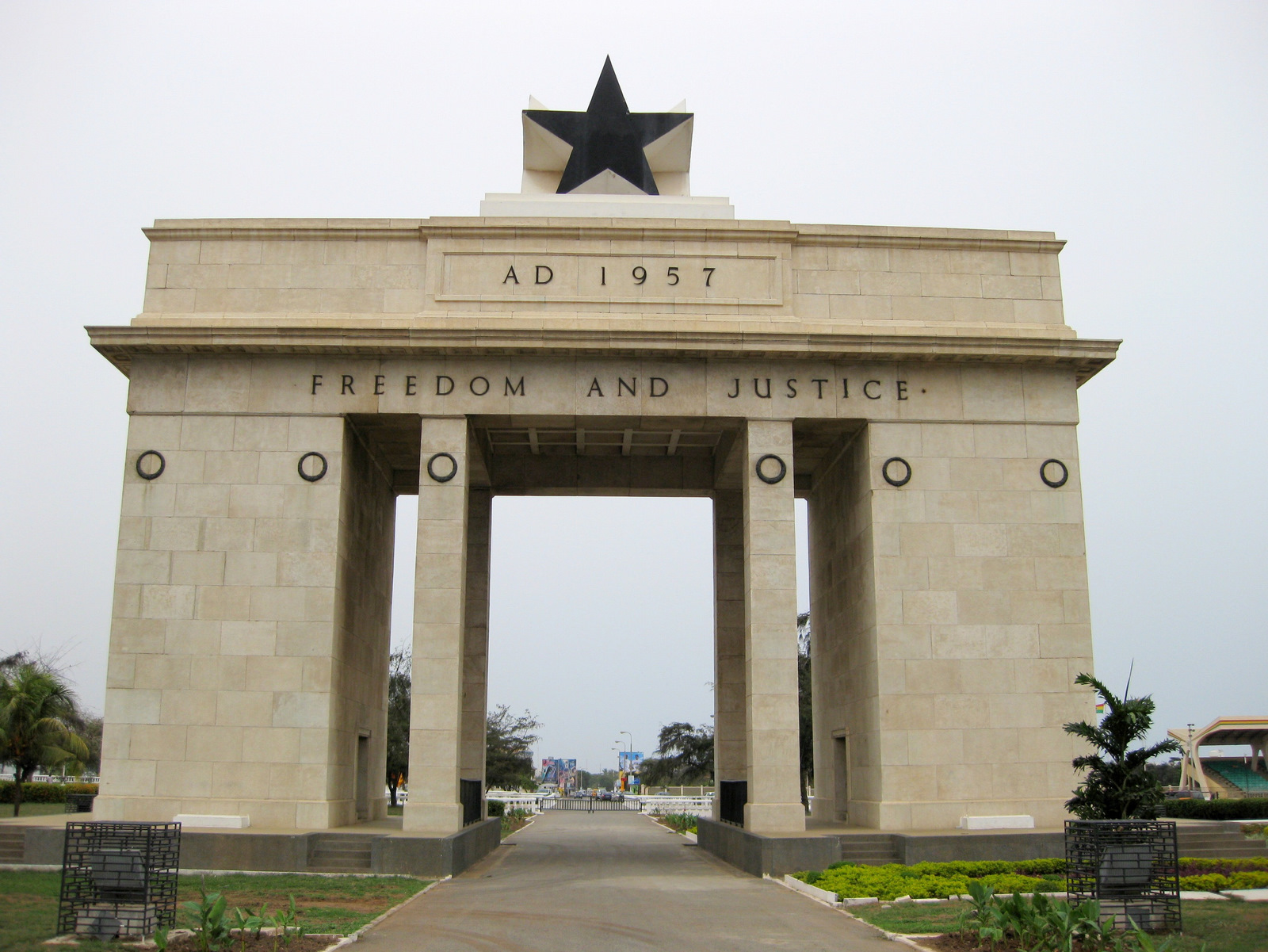 The Black Star Monument in Accra, built by Ghana's first president Kwame Nkrumah to commemorate the country's independence Nation-building is the process of creating a sense of identification with, and loyalty to, the state.[79][80] Nation-building projects seek to replace loyalty to the old colonial power, and/or tribal or regional loyalties, with loyalty to the new state. Elements of nation-building include creating and promoting symbols of the state like a flag, a coat of arms and an anthem, monuments, official histories, national sports teams, codifying one or more Indigenous official languages, and replacing colonial place-names with local ones.[78] Nation-building after independence often continues the work began by independence movements during the colonial period. Language policy From the perspective of language policy (or language politics), "linguistic decolonization" entails the replacement of a colonizing (imperial) power's language with a given colony's indigenous language in the function of official language. With the exception of colonies in Eurasia, linguistic decolonization did not take place in the former colonies-turned-independent states on the other continents ("Rest of the World").[81] Linguistic imperialism is the imposition and enforcement of one dominant language over other languages, and one response to this form of imperialism is linguistic decolonization.[82][83] Settled populations See also: Settler colonialism Decolonization is not an easy matter in colonies with large settler populations, particularly if they have been there for several generations. When settlers remain in former colonies after independence, colonialism is ongoing and takes the form of settler colonialism, which is highly resistant to decolonisation.[84] In a few cases, settler populations have been repatriated. For instance, the decolonization of Algeria by France was particularly uneasy due to the large European population (see also pied noir),[85] which largely evacuated to France when Algeria became independent.[86] In Zimbabwe, former Rhodesia, Robert Mugabe seized property from white African farmers, killing several of them, and forcing the survivors to emigrate.[87][88] A large Indian community lived in Uganda as a result of Britain colonizing both India and East Africa, and Idi Amin expelled them for domestic political gain.[89] Cinematography Kenyan writer Ngũgĩ wa Thiong'o has written about colonization and decolonization in the film universe. Born in Ethiopia, filmmaker Haile Gerima describes the "colonization of the unconscious" he describes experiencing as a child:[90] ...as kids, we tried to act out the things we had seen in the movies. We used to play cowboys and Indians in the mountains around Gondar...We acted out the roles of these heroes, identifying with the cowboys conquering the Indians. We didn't identify with the Indians at all and we never wanted the Indians to win. Even in Tarzan movies, we would become totally galvanized by the activities of the hero and follow the story from his point of view, completely caught up in the structure of the story. Whenever Africans sneaked up behind Tarzan, we would scream our heads off, trying to warn him that 'they' were coming". In Asia, kung fu cinema emerged at a time Japan wanted to reach Asian populations in other countries by way of its cultural influence. The surge in popularity of kung fu movies began in the late 1960s through the 1970s. Local populations were depicted as protagonists opposing "imperialists" (foreigners) and their "Chinese collaborators".[90] Economic development Main article: Economic development Newly independent states also had to develop independent economic institutions – a national currency, banks, companies, regulation, tax systems, etc. Many colonies were serving as resource colonies which produced raw materials and agricultural products, and as a captive market for goods manufactured in the colonizing country. Many decolonized countries created programs to promote industrialization. Some nationalized industries and infrastructure, and some engaged in land reform to redistribute land to individual farmers or create collective farms. Some decolonized countries maintain strong economic ties with the former colonial power. The CFA franc is a currency shared by 14 countries in West and Central Africa, mostly former French colonies. The CFA franc is guaranteed by the French treasury. After independence, many countries created regional economic associations to promote trade and economic development among neighboring countries, including the Association of Southeast Asian Nations (ASEAN), the Economic Community of West African States (ECOWAS), and the Gulf Cooperation Council. Effects on the colonizers John Kenneth Galbraith argues that the post–World War II decolonization was brought about for economic reasons. In A Journey Through Economic Time, he writes: "The engine of economic well-being was now within and between the advanced industrial countries. Domestic economic growth – as now measured and much discussed – came to be seen as far more important than the erstwhile colonial trade.... The economic effect in the United States from the granting of independence to the Philippines was unnoticeable, partly due to the Bell Trade Act, which allowed American monopoly in the economy of the Philippines. The departure of India and Pakistan made small economic difference in the United Kingdom. Dutch economists calculated that the economic effect from the loss of the great Dutch empire in Indonesia was compensated for by a couple of years or so of domestic post-war economic growth. The end of the colonial era is celebrated in the history books as a triumph of national aspiration in the former colonies and of benign good sense on the part of the colonial powers. Lurking beneath, as so often happens, was a strong current of economic interest – or in this case, disinterest." In general, the release of the colonized caused little economic loss to the colonizers. Part of the reason for this was that major costs were eliminated while major benefits were obtained by alternate means. Decolonization allowed the colonizer to disclaim responsibility for the colonized. The colonizer no longer had the burden of obligation, financial or otherwise, to their colony. However, the colonizer continued to be able to obtain cheap goods and labor as well as economic benefits (see Suez Canal Crisis) from the former colonies. Financial, political and military pressure could still be used to achieve goals desired by the colonizer. Thus decolonization allowed the goals of colonization to be largely achieved, but without its burdens. |
課題 脱植民地化の典型的な課題には、国家建設、国民建設、経済開発などがある。 国家建設 メイン記事:国家建設 独立後、新生国家は主権国家としての制度を確立または強化する必要があった。すなわち、政府、法律、軍隊、学校、行政システムなどである。独立前に与えら れた自治の範囲や、独立後の宗主国や国際機関からの援助は、宗主国や個々の植民地によって大きく異なっていた[78]。 一部の絶対君主制国家を除き、ほとんどの植民地独立後の国家は共和制または立憲君主制を採用している。これらの新しい国家は、憲法や選挙制度、その他の代 議制民主主義の制度を考案する必要があった。 国家建設 メイン記事: 国家建設  ガーナ初代大統領クワメ・エンクルマが独立を記念して建設したアクラのブラックスター記念碑 国家建設とは、国家への帰属意識と忠誠心を醸成するプロセスである[79][80]。国家建設プロジェクトは、旧宗主国や部族、地域への忠誠心を、新生国 家への忠誠心に置き換えることを目的としている。国家建設の要素には、国旗、国章、国歌、記念碑、公式の歴史、ナショナルスポーツチーム、1つまたは複数 の先住民の公用語の制定、植民地時代の地名の地元名への変更など、国家のシンボルを創造し、推進することが含まれる[78]。独立後の国家建設は、植民地 時代に独立運動によって始められた作業をしばしば継続する。 言語政策 言語政策(または言語政治)の観点から、「言語的脱植民地化」とは、植民地(帝国)の言語をその植民地の固有の言語に置き換えることを意味する。ユーラシ ア大陸の植民地を除いて、言語的脱植民地化は他の大陸(「世界の残りの地域」)の旧植民地から独立した国家では行われなかった[81]。言語帝国主義と は、ある支配的な言語を他の言語よりも優先させ、強制することであり、この帝国主義に対する一つの反応が言語的脱植民地化である[82][83]。 定住人口 関連項目: 入植植民地主義 特に数世代にわたって入植者が居住している植民地では、脱植民地化は容易ではない。独立後も入植者が旧植民地に留まる場合、植民地主義は継続し、入植者植 民地主義という形をとる。これは脱植民地化に非常に抵抗する。 いくつかのケースでは、入植者人口が本国に送還された。例えば、アルジェリアのフランスによる脱植民地化は、ヨーロッパ系住民が多数を占めていたため (ピードノワールも参照)[85]、特に不安定なものとなった。アルジェリアが独立すると、その大半がフランスに避難した[86]。ジンバブエ(旧ローデ シア)では、ロバート・ムガベが白人アフリカ人農民から財産を奪い、数人を殺害し、生き残った人々にも移住を強制した [87][88] 英国がインドと東アフリカの両方を植民地化した結果、ウガンダには大規模なインド人コミュニティが存在したが、イディ・アミンは国内政治的利益のために彼 らを追放した[89]。 映画 ケニア人作家ンゴ・ワ・ティオンゴは、映画の世界における植民地化と脱植民地化について書いている。エチオピア生まれの映画監督ハイレ・ゲリマは、子供の 頃に経験した「無意識の植民地化」について次のように述べている。 子供だった私たちは、映画で見たことを真似して演じてみた。 ゴンダール周辺の山で、カウボーイとインディアンごっこをよくした。私たちは、インディアンを征服するカウボーイに感情移入しながら、ヒーローの役を演じ ていた。インディアンに感情移入することはまったくなく、インディアンに勝ってほしかったことは一度もない。ターザン映画でも、私たちはヒーローの活躍に すっかり魅了され、彼の視点で物語を追った。物語の構造にすっかり夢中になり、アフリカ人がターザンの背後に忍び寄るたびに、私たちは「彼らが来る」と彼 に警告しようと、声を限りに叫んだ。 アジアでは、日本が文化的な影響力によって他国のアジア人住民にアピールしようとした時期に、カンフー映画が登場した。カンフー映画の人気が急上昇したの は、1960年代後半から1970年代にかけてのことである。現地の人々が「帝国主義者」(外国人)と「中国の協力者」に抵抗する主人公として描かれた [90]。 経済開発 メイン記事:経済開発 新たに独立した国家は、独自の経済制度(自国通貨、銀行、企業、規制、税制など)を開発する必要もあった。 多くの植民地は、原材料や農産物を生産する資源植民地、あるいは植民地国で生産された商品の独占市場として機能していた。多くの脱植民地化国は、工業化を 促進するプログラムを作成した。一部の国では、産業やインフラを国有化し、一部の国では土地改革を行い、土地を個々の農民に再分配したり、集団農場を作っ たりした。 一部の脱植民地化国は、かつての宗主国と強い経済関係を維持している。 CFAフランは、西アフリカおよび中央アフリカの14カ国(ほとんどがかつてのフランス植民地)で流通している通貨である。 CFAフランはフランス財務省によって保証されている。 独立後、多くの国は近隣諸国間の貿易と経済発展を促進するために地域経済連合を設立した。その例としては、東南アジア諸国連合(ASEAN)、西アフリカ 諸国経済共同体(ECOWAS)、湾岸協力会議(GCC)などがある。 植民地支配国への影響 ジョン・ケネス・ガルブレイスは、第二次世界大戦後の脱植民地化は経済的理由から生じたものであると主張している。著書『経済の時を旅して』の中で、彼は 次のように述べている。 「経済繁栄のエンジンは、先進工業国内部および先進工業国間にあった。現在のように測定され、盛んに議論されるようになった国内経済成長は、かつての植民 地貿易よりもはるかに重要であるとみなされるようになった。フィリピン独立に伴う米国経済への影響は、ベル貿易法によって米国のフィリピン経済独占が許可 されたこともあり、ほとんど見られなかった。インドとパキスタンの独立は、英国経済にほとんど影響を与えなかった。オランダの経済学者たちは、インドネシ アにおけるオランダ帝国の崩壊による経済損失は、戦後の国内経済成長が2年ほど続いたことで相殺されたと計算した。植民地時代の終焉は、かつての植民地に おける国家の野望と、植民地宗主国の良識の勝利として歴史書に記されている。しかし、その裏には、往々にして見られるように、経済的利益、あるいはこの場 合は経済的不利益という強い潮流が潜んでいた。 一般的に、被植民地の独立によって、植民地宗主国に経済的な損失はほとんど生じなかった。その理由の一つは、大きなコストが削減され、その一方で、別の手 段によって大きな利益が得られたためである。脱植民地化により、植民地支配者は被植民地に対する責任を放棄することができた。植民地支配者は、もはや被植 民地に対する経済的あるいはその他の義務を負う必要がなくなった。しかし、植民地支配者は引き続き、かつての植民地から安価な商品や労働力、そして経済的 利益(スエズ運河危機を参照)を得ることができた。植民地支配者が望む目的を達成するために、金融、政治、軍事的な圧力を依然として利用することができ た。このように、脱植民地化によって植民地化の目標は大部分達成されたが、その負担はなくなった。 |
Assassinated anti-colonialist
leaders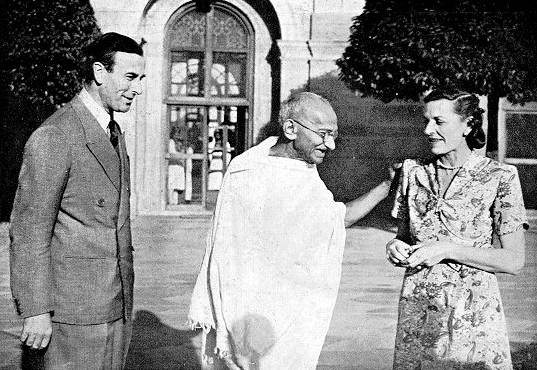 Gandhi in 1947, with Lord Louis Mountbatten, Britain's last Viceroy of India, and his wife Vicereine Edwina Mountbatten. 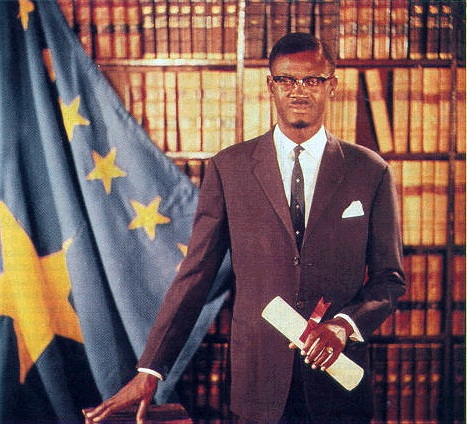 Patrice Lumumba, first democratically elected Prime Minister of the Congo-Léopoldville, was murdered by Belgian-supported Katangan separatists in 1961. A non-exhaustive list of assassinated leaders would include: 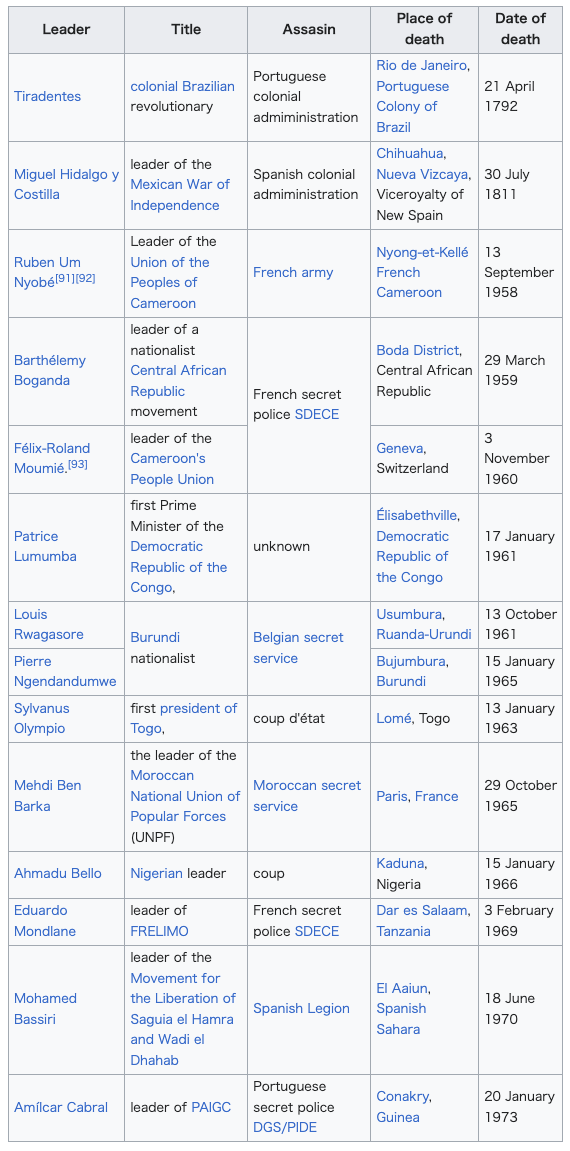 |
反植民地主義の指導者の暗殺 1947年、ガンディーは、インド最後の総督であるマウントバッテン卿とその妻である副王夫人エドウィナ・マウントバッテンとともに写っている。  コンゴ・レオポルドヴィルで初めて民主的に選出された首相パトリス・ルムンバは、ベルギーが支援するカタンガ分離主義者によって1961年に殺害された。 暗殺された指導者の不完全なリストには、以下が含まれる。  |
| Current colonies The United Nations, under "Chapter XI: Declaration Regarding Non-Self Governing Territories" of the Charter of the United Nations, defines Non-Self Governing Nations (NSGSs) as "territories whose people have not yet attained a full measure of self-government"—the contemporary definition of colonialism.[94] After the conclusion of World War II with the surrender of the Axis Powers in 1945, and two decades into the latter half of the 20th century, over three dozen "states in Asia and Africa achieved autonomy or outright independence" from European administering powers.[95] As of 2020, 17 territories remain under Chapter XI distinction:[96] United Nations NSGS list 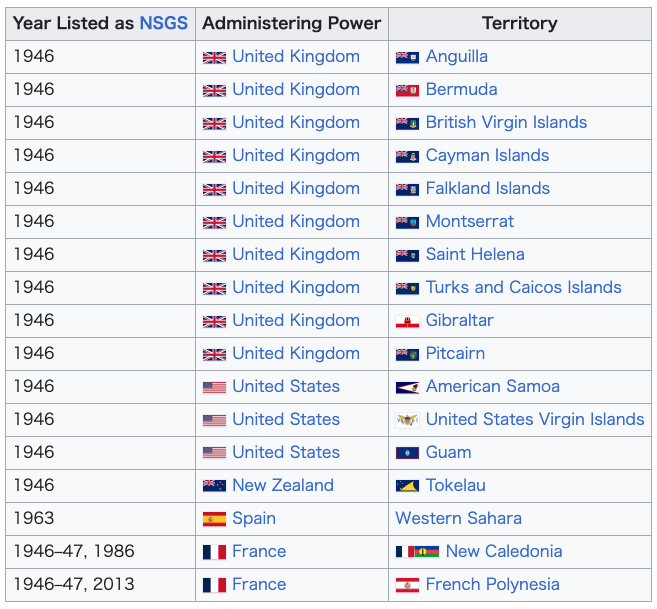 "On 26 February 1976, Spain informed the Secretary-General that as of that date it had terminated its presence in the Territory of the Sahara and deemed it necessary to place on record that Spain considered itself thenceforth exempt from any responsibility of any international nature in connection with the administration of the Territory, in view of the cessation of its participation in the temporary administration established for the Territory. In 1990, the General Assembly reaffirmed that the question of Western Sahara was a question of decolonization which remained to be completed by the people of Western Sahara."[96] On 10 December 2010, the United Nations published its official decree, announcing the Third International Decade for the Eradication of Colonialism wherein the United Nations declared its "renewal of the call to States Members of the United Nations to speed up the process of decolonization towards the complete elimination of colonialism".[97] According to an article by scholar John Quintero, "given the modern emphasis on the equality of states and inalienable nature of their sovereignty, many people do not realize that these non-self-governing structures still exist".[98] Some activists have claimed that the attention of the United Nations was "further diverted from the social and economic agenda [for decolonization] towards "firefighting and extinguishing" armed conflicts". Advocates have stressed that the United Nations "[remains] the last refuge of hope for peoples under the yolk [sic] of colonialism".[99] Furthermore, on 19 May 2015, UN Secretary-General Ban Ki-moon addressed the attendants of the Caribbean Regional Seminar on Decolonization, urging international political leaders to "build on [the success of precedent decolonization efforts and] towards fully eradicating colonialism by 2020".[99] The sovereignty of the Chagos Archipelago in the Indian Ocean is disputed between the United Kingdom and Mauritius. In February 2019, the International Court of Justice in The Hague ruled that the United Kingdom must transfer the islands to Mauritius as they were not legally separated from the latter in 1965.[100] On 22 May 2019, the United Nations General Assembly debated and adopted a resolution that affirmed that the Chagos Archipelago "forms an integral part of the territory of Mauritius".[101] The UK does not recognize Mauritius' sovereignty claim over the Chagos Archipelago.[102] In October 2020, Mauritian Prime Minister Pravind Jugnauth described the British and American governments as "hypocrites" and "champions of double talk" over their response to the dispute.[103] Settler colonies Main article: Settler colonialism Some authors contend that even in countries that have become politically independent from a former colonial power, indigenous peoples may still in effect be living under the impacts of colonization. In a 2023 paper on the political theory of settler colonialism, Canadian academics Yann Allard-Tremblay and Elaine Coburn posit that: "In Africa, the Middle East, South America, and much of the rest of the world, decolonization often meant the expulsion or departure of most colonial settlers. In contrast, in settler colonial states like New Zealand, Australia, Canada, and the United States, settlers have not left, even as independence from the metropole was gained... The systemic oppression and domination of the colonized by the colonizer is not historical — firmly in the past — but ongoing and supported by radically unequal political, social, economic, and legal institutions."[104] |
現在の植民地 国連は、国連憲章の「第11章: 国連憲章の「第11章:非自治地域に関する宣言」において、非自治地域(NSGS)は「その住民が完全な自治権を獲得していない地域」と定義されている。 これは、植民地主義の現代的な定義である[94]。第二次世界大戦が1945年の枢軸国の降伏により終結した後、 1945年の枢軸国の降伏により第二次世界大戦が終結し、20世紀後半の20年間に、ヨーロッパの統治権力から「アジアとアフリカの30以上の国家が自治 または完全な独立を達成した」[95]。2020年現在、17の地域が引き続き第11章の区別下にある:[96] 国連の非政府組織(NSGS)リスト  「1976年2月26日、スペインは事務総長に対し、同日付をもってサハラ領土におけるスペインの存在を終了し、同領土に設立された暫定行政への参加停止 を踏まえ、同領土の管理に関連する国際的な責任から今後免除されるものと見なすと記録に残すことが必要であると通告した。1990年、国連総会は、西サハ ラ問題は植民地からの解放の問題であり、西サハラの人々がそれを達成しなければならないと改めて確認した。 2010年12月10日、国連は公式声明を発表し、植民地主義の撤廃に向けた第3次国際10年の開始を宣言した。 植民地主義の完全撤廃に向けた脱植民地化のプロセスを加速させるよう、国連加盟国に対する呼びかけを新たにする」と宣言した。[97] 学者ジョン・クインタロ氏の記事によると、「国家間の平等と 国家の主権は不可侵であるという近代の強調から、多くの人々は、このような非自治構造が依然として存在していることを認識していない」[98]。一部の活 動家は、国連の関心が「(脱植民地化のための)社会・経済的な課題から、武力紛争の「消火・鎮火」へとさらに逸脱した」と主張している。支持者たちは、国 連が「植民地主義の圧制下にある人々にとって、いまだに最後の希望の光である」と強調している[99]。さらに、2015年5月19日、潘基文国連事務総 長は、カリブ地域における脱植民地化セミナーに出席し、 脱植民地化に関するカリブ地域セミナーで演説し、国際的な政治指導者たちに「(過去の脱植民地化努力の成功を礎に)2020年までに植民地主義を完全に根 絶することを目指して」努力するよう呼びかけた[99]。 インド洋に浮かぶチャゴス諸島の主権は、イギリスとモーリシャスとの間で争われている。2019年2月、ハーグの国際司法裁判所は、1965年にイギリス とモーリシャスが法的に分離したわけではないため、イギリスは島をモーリシャスに移譲しなければならないとの判決を下した[100]。2019年5月22 日、国連総会は、チャゴス諸島は「モーリシャスの領土の不可分の一部」であると確認する決議を審議し、採択した[101]。モーリシャスの領土の一部を構 成する」と確認する決議を採択した[101]。イギリスはモーリシャスのチャゴス諸島に対する主権主張を認めていない[102]。2020年10月、モー リシャスのプラヴィンド・ジュグノート首相は、この紛争に対するイギリスとアメリカの対応について、両国政府を「偽善者」や「二枚舌のチャンピオン」と評 した[103]。 入植植民地 メイン記事: 入植植民地主義 一部の著者は、かつての宗主国から政治的に独立した国々においても、先住民は事実上植民地化の影響下に置かれている可能性があるとしている。2023年に 発表された入植者植民地主義の政治理論に関する論文で、カナダの学者ヤン・アラード=トレムレイとエレイン・コバーンは次のように述べている。「アフリ カ、中東、南米、そして世界の多くの地域において、脱植民地化は多くの植民地入植者の追放や退去を意味することが多かった。対照的に、ニュージーランド、 オーストラリア、カナダ、米国といった入植者植民地国家では、宗主国からの独立が達成された後も入植者が去ることはなかった... 植民地支配者による被植民地の組織的な抑圧と支配は、歴史的なものではなく、過去から現在まで続いており、政治、社会、経済、法律の分野における根本的な 不平等によって支えられている。 |
| Indigenous decolonization theory Indigenous decolonization theory views Western Eurocentric historical accounts and political discourse as an ongoing political construct that attempts to negate indigenous and marginalized peoples and their experiences around the world. Indigenous people of the world precede and negate all Eurocentric colonization projects and the resulting historical constructs, popular discourse, conceptualizations, and theory. In this view, the independence of European-styled former Western-European colonies, such as the United States, Australia, and Brazil, is conceptualized as ongoing neo-colonization projects of settler colonialism and not as decolonization. The creation of these states merely continued ongoing European colonialism. Any former European colony not free of Western European influence fits such a concept. Examples of such former colonies include South Africa, Australia, Mexico, Brazil, and the United States.[105] |
先住民脱植民地化理論 先住民脱植民地化理論は、西欧中心の歴史記述や政治言説を、世界中の先住民や周縁化された人々とその経験を否定しようとする、現在進行中の政治的構築物で あるとみなす。世界の先住民は、あらゆる西欧中心の植民地化プロジェクトとその結果としての歴史的構築物、一般的な言説、概念化、理論に先んじて、それら を否定する。この見解では、米国、オーストラリア、ブラジルなど、ヨーロッパ型の旧西欧植民地の独立は、入植者植民地主義の継続的な新植民地化プロジェク トとして概念化され、脱植民地化とはみなされない。これらの国家の誕生は、単に進行中のヨーロッパの植民地主義を継続しただけである。西欧の影響から完全 に解放されていない旧ヨーロッパ植民地は、すべてこのような概念に当てはまる。そのような旧植民地の例としては、南アフリカ、オーストラリア、メキシコ、 ブラジル、米国などが挙げられる[105]。 →「先住民の視点からグローバル・スタディーズを再構築する領域横断研究」 |
| Decolonization of knowledge This section is an excerpt from Decolonization of knowledge.[edit] 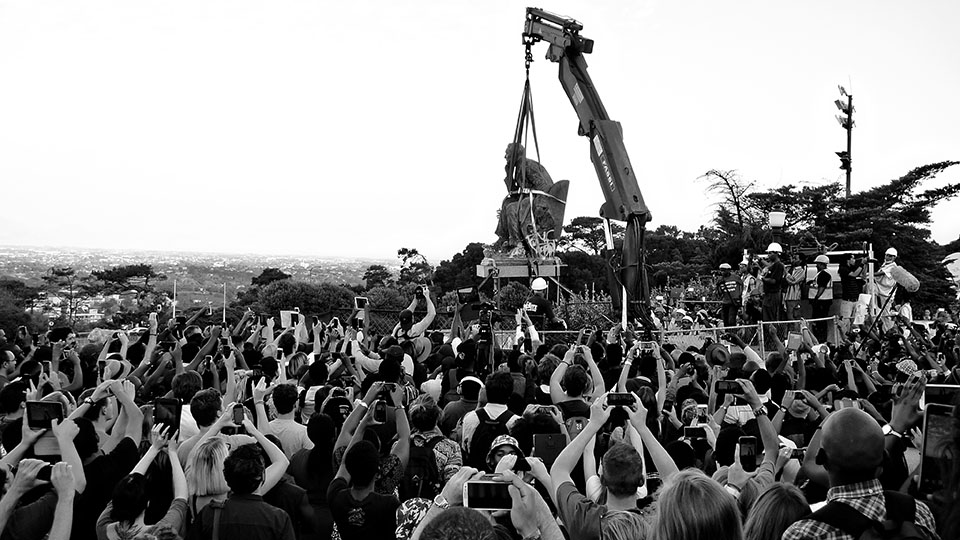 Removal of the statue of Cecil Rhodes from the campus of the University of Cape Town on 9 April 2015. Rhodes Must Fall movement is said to have been motivated by a desire to decolonize knowledge and education in South Africa.[106] Decolonization of knowledge (also epistemic decolonization or epistemological decolonization) is a concept advanced in decolonial scholarship[note 1][note 2] that critiques the perceived hegemony of Western knowledge systems.[note 3] It seeks to construct and legitimize other knowledge systems by exploring alternative epistemologies, ontologies and methodologies.[109] It is also an intellectual project that aims to "disinfect" academic activities that are believed to have little connection with the objective pursuit of knowledge and truth. The presumption is that if curricula, theories, and knowledge are colonized, it means they have been partly influenced by political, economic, social and cultural considerations.[110] The decolonial knowledge perspective covers a wide variety of subjects including philosophy (epistemology in particular), science, history of science, and other fundamental categories in social science.[111] |
知識の脱植民地化 このセクションは『知識の脱植民地化』からの抜粋であ る[編集]。  2015年4月9日、ケープタウン大学のキャンパスからセシル・ローズの銅像が撤去された。ローデス・マスト・フォール運動は、南アフリカの知識と教育を 非植民地化したいという願いから始まったと言われている[106]。 知識の非植民地化(epistemic decolonizationまたはepistemological decolonizationとも呼ばれる)は、脱植民地化研究[注釈 1][注釈 2]で提唱された概念であり、 西洋の知識体系の支配的立場を批判するものである[注3]。代替となる認識論、存在論、方法論を探求することで、他の知識体系を構築し、正当化しようとす るものである[109]。また、知識と真実の客観的な追求とはほとんど関係がないと考えられている学術活動を「浄化」することを目的とした知的プロジェク トでもある。その前提は、カリキュラム、理論、知識が植民地化されている場合、それらは政治、経済、社会、文化的な考慮事項によって部分的に影響を受けて いることを意味する、というものである[110]。脱植民地化知識の視点は、哲学(特に認識論)、科学、科学史、社会科学におけるその他の基礎的なカテゴ リーなど、幅広い分野をカバーしている[111]。 |
| Consequences of decolonization A 2019 study found that "democracy levels increased sharply as colonies gained internal autonomy in the period immediately before their independence. However, conflict, revenue growth, and economic growth did not systematically differ before and after independence."[112] According to political theorist Kevin Duong, decolonization "may have been the century's greatest act of disenfranchisement", as numerous anti-colonial activists primarily pursued universal suffrage within empires rather than independence: "As dependent territories became nation-states, they lost their voice in metropolitan assemblies whose affairs affected them long after independence."[113] David Strang writes that the loss of their empires turned France and Britain into "second-rate powers".[114] |
脱植民地化の帰結 2019年の研究では、「植民地が独立直前に内部自治を獲得すると、民主主義のレベルが急激に上昇した。しかし、独立前と独立後で、紛争、歳入の増加、経 済成長に系統的な違いは見られなかった」[112]ことが明らかになった。 政治理論家のケビン・ドゥオンによると、脱植民地化は「この世紀最大の権利剥奪行為だったかもしれない」という。多数の反植民地活動家が、独立よりも帝国 内での普通選挙を主に追求していたためである。「従属地域が国民国家になると、独立後も長い間、彼らに影響を与える問題について、本国議会で発言権を失っ た」[113]。 デビッド・ストレンジは、帝国を失ったことでフランスとイギリスは「二流の権力」になったと書いている[114]。 |
| Decolonizing global health Global health, as a discipline, is widely acknowledged to be of imperial origin and the need for its decolonisation has been widely recognised.[115][116][117] Dismantling the feudal structure of global health has been mentioned to be a key decolonisation agenda.[118] Some key leaders of the decolonising global health agenda are Seye Abimbola and Madhukar Pai. [115]Kwete, Xiaoxiao; Tang, Kun; Chen, Lucy; Ren, Ran; Chen, Qi; Wu, Zhenru; Cai, Yi; Li, Hao (December 2022). "Decolonizing global health: what should be the target of this movement and where does it lead us?". Global Health Research and Policy. 7 (1): 3. doi:10.1186/s41256-022-00237-3. PMC 8784247. PMID 35067229 [116]Rasheed, Muneera A (December 2021). "Navigating the violent process of decolonisation in global health research: a guideline". The Lancet Global Health. 9 (12): e1640–e1641. doi:10.1016/S2214-109X(21)00440-X. PMID 34798014. S2CID 244286291. [117]Affun-Adegbulu, Clara; Adegbulu, Opemiposi (August 2020). "Decolonising Global (Public) Health: from Western universalism to Global pluriversalities". BMJ Global Health. 5 (8): e002947. doi:10.1136/bmjgh-2020-002947. PMC 7443258. PMID 32819916. [118] Keshri, Vikash Ranjan; Bhaumik, Soumyadeep (September 2022). "The feudal structure of global health and its implications for decolonisation". BMJ Global Health. 7 (9): e010603. doi:10.1136/bmjgh-2022-010603. PMC 9516156. PMID 36167407. |
脱植民地化によるグローバルヘルス グローバルヘルスは学問分野として、帝国主義に由来するものであることが広く認められており、その脱植民地化の必要性が広く認識されている[115] [116][117]。グローバルヘルスの封建的構造を解体することが、脱植民地化のアジェンダとして重要であると指摘されている[118]。脱植民地化 グローバルヘルスアジェンダの主なリーダーには、セイ・アビンボラとマドゥカル・パイがいる。 [115]Kwete, Xiaoxiao; Tang, Kun; Chen, Lucy; Ren, Ran; Chen, Qi; Wu, Zhenru; Cai, Yi; Li, Hao (December 2022). "Decolonizing global health: what should be the target of this movement and where does it lead us?". Global Health Research and Policy. 7 (1): 3. doi:10.1186/s41256-022-00237-3. PMC 8784247. PMID 35067229 [116]Rasheed, Muneera A (December 2021). "Navigating the violent process of decolonisation in global health research: a guideline". The Lancet Global Health. 9 (12): e1640–e1641. doi:10.1016/S2214-109X(21)00440-X. PMID 34798014. S2CID 244286291. [117]Affun-Adegbulu, Clara; Adegbulu, Opemiposi (August 2020). "Decolonising Global (Public) Health: from Western universalism to Global pluriversalities". BMJ Global Health. 5 (8): e002947. doi:10.1136/bmjgh-2020-002947. PMC 7443258. PMID 32819916. [118] Keshri, Vikash Ranjan; Bhaumik, Soumyadeep (September 2022). "The feudal structure of global health and its implications for decolonisation". BMJ Global Health. 7 (9): e010603. doi:10.1136/bmjgh-2022-010603. PMC 9516156. PMID 36167407. |
| Anti-imperialism Blue water thesis Coloniality of power Colonial mentality Creole nationalism Decoloniality Decolonization of the Americas Dependency theory Exploitation colonialism Indigenism Indigenismo Neocolonialism Organisation internationale de la Francophonie Organisation of Ibero-American States Partition (politics) Periphery countries Political history of the world Postcolonialism Repatriation (cultural heritage) Repatriation and reburial of human remains Revanchism Secession Separatism Subaltern (postcolonialism) Indigenous survival during colonization Timeline of national independence United Nations list of non-self-governing territories Wars of independence Décolonisation de l'espace public (fr) |
反
帝国主義 ブルーウォーター・セオリー 権力の植民地性 植民地意識 クレオール民族主義 脱植民地化 アメリカ大陸の脱植民地化 従属理論 搾取的植民地主義 インディヘニズム インディヘニスム 新植民地主義 国際フランコフォニー機構 米州機構 分割(政治) 周辺諸国 世界の政治史 世界の ポストコロニアル主義 返還(文化遺産) 遺骨の返還と再埋葬 復讐主義 分離 分離主義 サブオルタナ(ポストコロニアル主義) 植民地化における先住民の生存 国家独立の年表 国際連合非自治地域リスト 独立戦争 公共空間の脱植民地化(フランス語) |
| Decolonisations,
TV Series, Arte, 3 X 52’, the European culture TV Channel, director:
Karim Miské, Marc Ball, Pierre Singaravélou, Grand URTI Prize for
arthouse documentary (2020) Le Sueur, James D. ed. The Decolonisation Reader (Routledge, 2003) Madden, Frederick, ed. The End of Empire: Dependencies since 1948 : Select Documents on the Constitutional History of the British Empire and Commonwealth – Vol. 1 (2000) [ISBN missing], 596pp Mansergh, Nicholas, ed. Documents and Speeches on Commonwealth Affairs, 1952–1962 (1963) [ISBN missing] Wiener, Joel H. ed. Great Britain: Foreign Policy and the Span of Empire, 1689–1971: A Documentary History – Vol. 4 (1972) [ISBN missing] 712 pp; Covers 1872 to 1968. |
脱植民地化、テレビシリーズ、アルテ、3 x
52分、ヨーロッパ文化テレビチャンネル、監督:カリム・ミスケ、マーク・ボール、ピエール・シンガラヴェルー、アート系ドキュメンタリー部門グランプリ
(2020年) ル・スール、ジェームズ・D.編著『脱植民地化読本』(Routledge、2003年) マデン、フレデリック編著『帝国の終焉:1948年以降の従属関係: 『大英帝国および英連邦の憲法史に関する文書』第1巻(2000年) [ISBN不明]、596ページ マンスー、ニコラス編『英連邦問題に関する文書および演説集』1952年~1962年(1963年) [ISBN不明] ウィーナー、ジョエル・H.編『イギリス:外交政策と帝国の広がり、1689年~1971年: 1972年) [ISBN 不明] 712ページ。1872年から1968年までの歴史を網羅。 |
| https://en.wikipedia.org/wiki/Decolonization |
★文化的人種主義と脱植民地化の関係
エ
チエンヌ・バリバール
の「人種なき人種主義」という発想は興味ふかい.ヨーロッパにおける現今の「移民排斥」を生物学的人種主義(科学人種主義)に対比させて文化的人種主義と
位置付けるからだ.つまり1960年代の世界の脱植民地化のあとにやってきたのはUNメンバーシップ内の差別と排斥だ。それが本格化するのはポスト植民地
主義、帝国主義崩壊後の移民の移動とそれにともなう「開発國側」の過酷な差別とそれに呼応した国境管理の強化と、国内の新たなレイシストの台頭ということ
だ。
★フランツ・ファノンと脱植民地化の方法
ファノンは
植民地主義と脱植民地化に関する古典的な分析書『大地に呪われたること/人』(The Wretched of the Earth; Les
damnés de la
terre)で最もよく知られている。『大地に呪われた人』はジャン=ポール・サルトルの序文付きで1961年にマスペロ出版社から刊行された。
この本には、暴力と脱植民地化の考え方に焦点を当てた論文が含まれている。彼は、入植者と先住民の関係は対立の二項対立であるため、脱植民地化は本質的に暴力的なプロセスであると主張する。実際、彼は聖書の比喩「最後の者が最初になり、最初の者が最後になる」
を使って、脱植民地化の瞬間を表現している。入
植者の植民地主義という状況は、先住民の中に緊張を生み、それは時とともに高まり、多くの点で入植者によって助長される。この緊張は、最初は先住民の間で
解放されるが、やがて入植者に対する暴力のきっかけとなる。彼の研究は、多くの革命の学問的・理論的基礎となった(→「フランツ・ファノン」「ファノン『地に呪われた者たち』再考」)。
★
★脱 植民地化 : 帝国・暴力・国民国家の世界史 / デイン・ケネディ著 ; 長田紀之訳, 東京 : 白水社 , 2023.10/Decolonization : a very short introduction / Dane Kennedy, [New York] : Oxford University Press , 2016. - (Very short introductions)
「脱 植民地化は、18世紀末のアメリカ独立革命とハイチ独立に始まり新世界を席捲した第一波から、20世紀末のソ連解体によって引き起こされた第四波にいたる まで、複数回にわたって起きてきた。本書は、第二次世界大戦後のアジア・アフリカ全域で生じた第三波を、こうした長期の歴史に位置づける。また、世界各地 の事例を比較検討することで、脱植民地化という現象の特徴を浮き彫りにし、今日にも繋がるさまざまな暴力の源をグローバルな視点から問いなおす」書肆説明)。
第1章 脱植民地化の複数の波
第2章 グローバルな戦争が植民地にもたらしたこと
第3章 無秩序化し、再秩序化する世界
第4章 国民国家という問題
第5章 帝国の継続、忘却の政治
文 献
そ の他の情報
Copyleft, CC, Mitzub'ixi Quq Chi'j, 1996-2099
☆
 ☆
☆